










BY DAVID SAFFER
Israel remains on high alert for a terror attack from Iran and its proxies in Iraq, Syria and Yemen.
The IDF is prepared for all scenarios following the assassination of Ismail Haniyeh in Tehran and Fouad Shukr, number two to Hezbollah Secretary-General Hassan Nasrallah, in a targeted strike in Beirut last week.

The IRGC blame Israel for Haniyeh’s death but there has been no confirmation from the IDF. According to the Washington Post, following intense diplomatic efforts to avert a ‘catastrophic war’ in the Middle East, Iran may be reconsidering its response to Israel


despite rhetoric following Haniyeh’s death. Iran have reportedly accepted Haniyeh was not killed by an Israeli missile but by a bomb in his room. Hezbollah, though, has vowed to take revenge for the elimination of Shukr. Tensions remain across Israel and the Diaspora. And it follows news that Hamas has appointed Yahya Sinwar as leader following Haniyeh’s assassination. The IDF has vowed to eliminate Sinwar however long it takes.


Continued on page 3







SEA-VIEW APARTMENTS FOR LIVING OR INVESTMENT


Savvy Modern Or thodox Anglos are racing to buy the last available sea-view proper ties in Ashkelon right opposite the Marina!
We specialize in this beautiful city which is fast becoming the SAFEST location in Israel. Tell us what your ideal is, whether house or condo, and we’ll find it for you!
• Only 30 minutes to airpor t and one hour to Jerusalem
• • • •
New high-speed trains, only 40 minutes to Tel Aviv
Proven to be an excellent investment
Earn r ental money when you ’ re away Mor tgages available at no extra fee
• Close to many shuls and the ver y best beaches
• Only 20% down and balance upon completion
• Superior interior design ser vices
• Largest range of resales available





Continued from page 1
Chief of the General Staff, Herzi Halevi, visited Tel Nof Air Force Base where he met squadrons.
He said: “The change in his (Sinwar’s) title not only doesn’t prevent us from pursuing him, it motivates us to find him, target him and force them to replace the head of the Political Bureau once again. We have carried out important operations in recent weeks, eliminating the most senior commanders of our most problematic enemies, we are not stopping.”
Regarding a potential Iran strike, he commented: “We know how to carry out a very rapid offensive anywhere in Lebanon, Gaza or the Middle East, above and below ground. I believe that the professionalism of the Israeli Air Force in utilising intelligence, selecting the right munitions and maintaining all aircraft, munitions and equipment at the highest state of readiness will work for us. We send a very clear message to our enemies. Those who attack us and talk about destroying the State of Israel we will harm and continue to grow stronger.”
As Middle East experts debate what retaliation may come, and when, President Isaac Herzog addressed Jewish communities around the world exactly 10 months on from October 7.
Herzog spoke of the resilience of Israeli people, the capabilities of defense and security services, and alliance with Israel’s allies.
“These are difficult moments for the State of Israel and the Jewish people,” he said. “Our enemies, poisoned by hatred,

blinded by radicalism and antisemitism, have vowed to attack us again. We all feel the tension, the anxiety and the vulnerability of these moments. But, I want to state clearly, we have the capacity to confront our enemies and to defeat them.”
Prime Minister Benjamin Netanyahu reiterated Israel’s stance against Iran at the IDF induction base at Tel Hashomer where he met Armoured Corps and Combat Engineer recruits.
He told them: “We are prepared defensively and offensively. We are striking our enemies and are determined to defend ourselves.”
Targets for terrorist factions include Israeli embassies and Jewish community buildings.
Israel’s National Security Council website has advice regarding public places, displaying signs of Israeli or Jewish identity and staying away from demonstrations and protests.
The NSC recommends flights not entering airspace of enemy countries including Lebanon, Iran, Syria, Yemen and Iraq, countries with a high threat level or with no diplomatic ties with Israel such as Afghanistan, Libya, Somalia, Pakistan and Algeria.
Are you concerned about the lack o transparency with your property management?
Are you frustrated with unexpected fees and charges?
Say goodbye to the headaches and hassle of dealing with unprofessional managing agents
Experience peace of mind knowing that your property is in good hands. Switch to Roundtree today and discover the white glove treatment




BY ADAM MOSES
Hostage campaigners around the world marked the fifth birthday of Ariel Bibas who is still held captivity in Gaza.
Ariel was abducted from Kibbutz Nir Oz with his 9-month old baby brother Kfir and parents Shiri and Yarden on October 7. Ariel’s grandparents Yossi and Margot Silberman were murdered that day.
Tel Aviv saw hundreds of demonstrators raise awareness to the 115 hostages in captivity.
At Palmeira Square in Brighton & Hove, campaigners displayed a Batman mask and cake for Ariel, a fan of the superhero.
Organiser Heidi Bachram said: “I wish
Batman was real. I wish he would swoop in and save Ariel and his family. But Batman isn’t real. So, we must be the heroes that Ariel needs.”
Adam Ma’anit, whose cousin Tsachi Idan is a hostage in Gaza, read a moving letter from Ariel’s grandmother, Pnina Bibas, to him. Her words were spoken in Hostage Square in Tel Aviv and at events globally.
Pnina wrote: ‘The world around us continues to turn, but time seems to have frozen without you. You’ve grown a year older, but there’s no celebration… My heart skips a beat every time I remember how much you’re missed. I try to imagine the moment you’ll return to us. Will you
still call me ‘Grandma Nini’? … I can almost hear your laughter as you splash water on me while we water the plants in the garden. Every day I dream of the moment we’ll be together again.’
The Brighton birthday table event had a memorial to victims of Hamas. There were also yellow ribbons around trees to highlight hostages held in Gaza.


In Hendon, the Hostages & Missing Hostage Forum UK and Stop The Hate UK held an event as a celebration and reminder of Ariel’s ongoing captivity.
While children enjoyed face painting, glitter art, and arts n crafts, many attendees wore Batman T-shirts, masks and capes to show support for Ariel and his family.
Israeli artist Benzi Brockman created a portrait of Ariel with a birthday cake symbolising hope and the community’s unwavering support.
Dr. Haya Langerman, Stop The Hate UK, declared: “How can we accept a reality where a child is denied the simple joy of celebrating his birthday in freedom? Ariel and
his family deserve to come home. If Ariel could make a birthday wish, it would be for his freedom. This is the wish the world needs to hear and act upon now.” Organisers stressed the importance of international awareness to bring Ariel and his family home. Attendees were reminded of the impact of their voices to continue advocating for justice and freedom.

BY DAVID SAFFER
CST’s Antisemitic Incidents Report (January-June 2024) shows the highest total of antisemitic incidents recorded in the first half of any year.
The surge in antisemitism after Hamas’ October 7 terror attack has continued across social, political and cultural contexts. Over half of all incidents recorded are fueled by anger about Israel, Gaza, Hamas or the Middle East war and directed at Jews at schools, campuses, places of work, public transport, on the streets and online.
The most shocking are numbers are at schools and universities. ‘It sadly goes to show how antisemites use the Middle East as an excuse to act out Jew-hatred
even in the education sector,’ noted CST.
In addition to 1,978 antisemitic incidents recorded, CST received 1,493 reports not deemed antisemitic due to insufficient evidence of anti-Jewish language, motivation or targeting. They are not included in final totals but play an important role in informing CST’s provision of protection to the Jewish community.
Over the last six months, CST recorded 3,469 incidents across all categories.
Mark Gardner, CST Chief Executive said: “The CST will continue its steadfast protection of our British Jewish communities, driven by our values of Community, Security and Trust,” he noted. “CST applauds our community’s ever-increasing determination to stand strong and
proud, despite the hatred.”
Home Secretary Yvette Cooper described figures as truly appalling, commenting: “There is no place in Britain for this vile hatred, we are absolutely clear that those who push this poison on the streets or online must always face the full force of the law.”
Shadow Home Secretary James Cleverly added: “We must root out antisemitism. It is up to all of us to stop and reverse the increase in this vile hatred we have seen in the UK since the Hamas terror attack.
“It can never be right British Jews could be concerned for their safety on the streets of modern Britain.”
CST observed: ‘Protecting our community remains our number one priority. We
ask that now more than ever you remain vigilant and report suspicious behaviour or antisemitism to CST and the Police. No experience should go unheard, and no victim should ever go without help.’
In true community spirit, hundreds of volunteers became security officers for CST after October 7.
Six-week and two-day courses will run before the end of 2024. CST want people to sign up as volunteers.
‘These are challenging times but it’s clear to us the community has turned their fear into strength and CST will continue to do everything we can to keep the community safe,” CST said.
CST’s 24-hour emergency number is 0800 032 3263. To volunteer or for information: www.cst.org.uk







BY DAVID SAFFER
Israel has won a record-breaking number of medals at the Paris Olympics.
With increasingly worrying news from home for the Israeli delegation, who have had extra security due to death threats, the results have been hailed as a major boost to morale by Prime Minister Benjamin Netanyahu and President Isaac Herzog. The final tally may yet be higher by the end of games on Sunday.
Leading the way has been Tom Reuveny, whose brother is fighting in Gaza, who claimed a stunning gold medal in the men’s iQFoil windsurfing final in Marseille.
“I did it for our brave soldiers,” Reuveny, 24, of Rosh Ha’ayin, told Channel 12. “That was what I was thinking before I sailed, it’s so much bigger than me.” He added: “I was the dark horse and nobody expected me to win. In the semifinal, I was afraid to finish fourth or fifth, and that’s happened to me in the past, but I gave it my all and did everything.”
Sharon Kantor, 21, of Moshav Avihayil, near Netanya, won silver in the women’s final.
Kantor is the first Israeli woman to win a medal in the sport. “Look how many medals we’ve won,” said Kantor. “It’s incredible.”
Gymnast Artem Dolgopyat, 27, scooped silver in the floor exercise, following gold at the Tokyo Games in 2021. He said: “I came today feeling very good, now I’m the happiest I could be.”
President Isaac Herzog hailed Reuveny’s “amazing achievement”. He told the windsurfer: “You made an entire nation happy, a nation that is at war, you brought us a great light, you caused our national anthem to be played
at this Olympics in Paris.”
Herzog told Kantor she had “made history”. He told Dolgopyat: “I watched you and I was so impressed, you’re like a flying lion. I salute you.”
Netanyahu told windsurfers Reuveny and Kantor: “You have lifted the spirit of us all. The people of Israel are applauding you both.”
Reuveny, Kantor and Dolgopyat’s trio of medals in a day is a first for Israel, who have won a total of 19 medals in its history, judo and sailing the most decorated sports.
Netanyahu spoke with Raz Hershko, Inbar Lanir and Peter Paltchik who kept up the juduko legacy. Hershko, who won silver, said: “This is our goal, to come and represent the country in the best way possible. This medal is mine but in effect it belongs to us all.”

brought pride to the State of Israel, but at this time they lift the spirit of the nation.”
Netanyahu told Lanir, who won silver, and Paltchik, who claimed bronze: “You have brought a great achievement for the State of Israel, especially at this time. You have lifted all of our spirits. You waved the flag with pride and the entire nation saw and was proud.”
Addressing the medal winners, Netanyahu added: “You have brought victory, together with your colleagues in the delegation, huge victories, which have
Netanyahu also spoke with juduko coach Oren Smadja, who lost his son Omer in Gaza.
He told Smadja: “The fact that you are there and leading this, it makes this doubly meaningful.”
Oren told Netanyahu: “When you came to me, I was in a very difficult place. After the week of mourning, the first thing I did was to call the family together to get their approval to fly. Today we showed everyone what a fantastic country this is, how much we can succeed if we are together.”

Israel has enjoyed unprecedented Olympic success but the Paris games have been the most challenging since the 1972 Munich games.
Israel’s football team were jeered during the national anthem before facing Paraguay.
Footage of fans waving Palestinian flags while chants of ‘Heil Hitler’ has been reported. Security ejected protesters with a banner stating ‘Genocide Olympics’. French police have opened an investigation and are evaluating death threats against three Israeli athletes.
A Paris Olympics spokesperson said: ‘Paris 2024 strongly condemns these acts. A complaint has
been lodged by Paris 2024, which is at the disposal of the authorities to assist with the investigation.’
Before the action, the International Olympic Committee dismissed calls from the Palestinian Football Association to ban Israel. And 15 Israeli athletes including opening ceremony flagbearer, judoka Paltchik and swimmer Meiron Amir Cheruti received death threats, which saw security bolstered.
The Israeli Olympic Committee chair, Yael Arad, recognised trolling would happen.
“We were prepared for it,” he said. “We’ve instructed athletes on how to react if it happens.”
A Campaign Against Antisemitism spokesperson said: ‘When people think of the Olympics, they think of words like ‘honour’, ‘sportsmanship’ and ‘unity’. Antisemitism’ should not be on that list, there have been reports of death threats and anti-Semitic slogans hurled at Israeli competitors, staff, and fans. The Olympics is about displaying the best countries have to offer. This year, it has brought out the worst.’
Action Against Discrimination have condemned anti-Israel and antisemitic behaviour.
Jonathan Metliss, AAD chairman, said: “The demonisation of Israel in the sporting world is shocking and wholly unacceptable. Politics has no place in sport. This must be resisted at all costs by international sporting bodies, politicians and officials.”
Black September militants massacred 11 Israelis, including nine athletes, resulting in global headlines in 1972. Five Palestinian kidnappers and a German policeman died in a botched rescue attempt. The German government have since accepted responsibility for not securing the hostages release.
BY ADAM MOSES
Two Israelis were murdered in a stabbing attack in Holon on Sunday morning.
Rinat Daniv, 66, was murdered in front of her husband, Shimon, 69, who was seriously injured by a lone terrorist, Ammar Razek Kamel Odeh, 35, from Salfit. Another Israeli is in a critical condition.
Odeh, whose house has been mapped for demolition by the IDF, was shot by a police officer and later pronounced dead at Shamir Medical Center.
A preliminary investigation established Odeh entered Israel illegally last Thursday.
Prime Minister Benjamin Netanyahu commended police officers who saved many lives by eliminating the terrorist.
“We will settle accounts with whoever cooperated with him,” he said.
Netanyahu added: “Our fight against terrorism is relentless. The State of Israel is in a multi-front war against Iran’s axis of evil. We are striking every one of its arms with great force. We are prepared for any scenario both offensively and defensively. I reiterate and tell our enemies, we will respond and exact a heavy price for any act of aggression against us, from whatever quarter.”
President Isaac Herzog added: “On this
difficult morning, which brought such tragic news, I grieve, along with the entire nation, for the innocent victims of the terrible attack in Holon.”
Herzog added: “The world cannot turn a blind eye as our enemies attack us repeatedly with hate-filled terrorism, targeting innocent Israeli civilians whose only crime was wishing to live as a free people in their own land. I send my support to the IDF and security forces in their struggle to eradicate the threat of terror wherever it rears its ugly head.
We will not give up, we will not falter in our determination. We will continue to believe in the justness of our cause and work tirelessly to defend our people.”
Minister of Culture and Sports, Miki Zohar, spoke about Odeh being in Israel illegally.
“Israel is in a complex reality, a situation of several open fronts,” he said. “This does not prevent lone terrorists from trying to harm Israel, as happened this morning. The vigilance of citizens is important at this time. Israel needs to close its gates to all those people who want to enter to work and create other solutions by bringing foreign workers from around the world. It is forbidden to bring Palestinian workers here. They enter because there is a need. This needs
to be addressed.”
HaGaon HaRav Yitzchak Zilberstein, of the Moetzes Gedolei HaTorah and Rosh Kollel of Beis Dovid in Holon, published a letter at a request from residents who wanted his Daas Torah on the tragedy.
He wrote: “We are shocked and pained by the tragedy that befell our city of Holon, the murderous attack by a heinous terrorist, erev Rosh Chodesh… Each person should learn at least two halachos of hilchos Shabbos every day.”
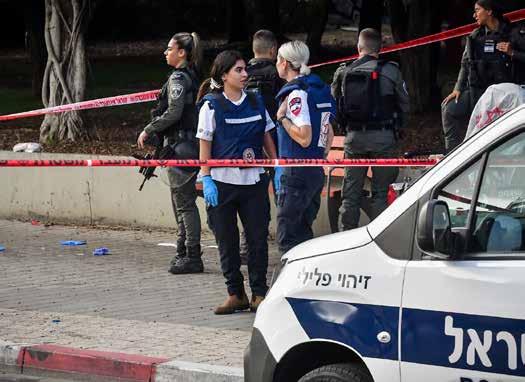
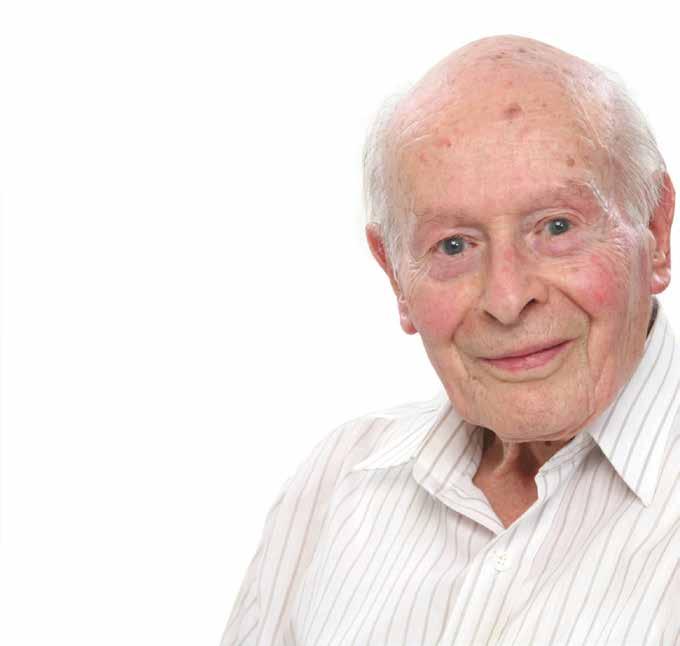
BY ADAM MOSES
Israel is determined to hunt down new Hamas leader Yahya Sinwar.
A key organiser of the October 7 terror attack, Sinwar succeeds Ismail Haniyeh following his assassination in Tehran last week.
IDF military spokesman, Rear Admiral Daniel Hagari, vowed to pursue him.
“Sinwar is a terrorist, who is responsible for the most brutal terrorist attack in history,” he said in a statement.
“There is only one place for Sinwar and it is beside Mohammed Deif and the rest of the 10/7 terrorists. That is the only place we’re preparing and intending for him.”
spoken about Israel’s stance on Sinwar. Speaking during negotiations for the release of the hostages recently, he gave a damning assessment of Hamas’ hardline new leader.
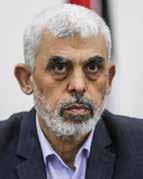
“The appointment of arch-terrorist Sinwar is yet another compelling reason to swiftly eliminate him and wipe this vile organisation off the face of the Earth,” Israeli Foreign Minister Israel Katz said on X.
Soon after the announcement rocket alert sirens sounded in Ashkelon, Sderot, Ibim, Nir Am and Zikim. The Iron Dome defence system intercepted one rocket, two fell in open fields.
Sinwar is hiding in tunnels under Gaza. He has evaded capture by the IDF on a number of occasions.
President Isaac Herzog has continually
“The world and us must face it, everything begins and ends with Sinwar,” he observed. “He’s the one who decided on the October massacre, he’s been seeking to shed the blood of the innocent ever since. It is he who aims to escalate the regional situation, to desecrate Ramadan, to do everything to shatter coexistence in our country and the whole region, to sow discord among us and around the world. He seeks terror, the entire world and our region must the responsibility lies with him alone. It won’t work. We won’t allow it… We must continue the fight, and we must get to Sinwar, either alive or dead, so that we can see the hostages back home.”
Sinwar founded Hamas’ security service in the 1980s. After his third arrest in 1988, he was sentenced to four life terms in prison but was released among 1,027 Palestinian and Israeli-Arab prisoners in the 2011 exchange deal for Gilad Shalit. Sinwar was appointed head of Hamas’ political bureau in the Gaza Strip in 2017.
The US has listed Sinwar on its blacklist of ‘international terrorists’.
BY HARRY SIMONS
Minister of Defence Yoav Gallant hosted UK Defence Secretary John Healey on his first visit to Israel since entering office.
Gallant provided Healey with an operational situation assessment and welcomed Britain’s ongoing support for Israel’s right to self-defence. He also spoke of establishing a coalition in Israel’s defence against Iran and its proxies to aid regional and global security.
Gallant discussed progress in eliminating Hamas’ leadership and infrastructure, and Israel’s commitment to ensuring the return of all hostages. A bilateral meeting with senior staff followed.
Shadow Foreign Secretary Andrew Mitchell, meantime, described the Labour government’s stalling of military equipment to Israel as “bizarre” amid the “direct threat from Hezbollah”.
Civil servants have reportedly paused applications for new military equipment export licenses after Foreign Minister David

Lammy’s review of Israel’s offensive against Hamas.
This may extend for months until Lammy announces a decision later this summer.
“For years, the Labour Left have sought to halt all arms exports to Israel, and now they have the levers of power, it seems it’s the first thing they have done”, an unnamed source told the Daily Mail.
“Just recently, British arms and military personnel were deployed to protect Israel from a direct assault by Iran”, Mitchell said.
The UK most recently revoked licenses to Israel under the Brown Government in 2009.
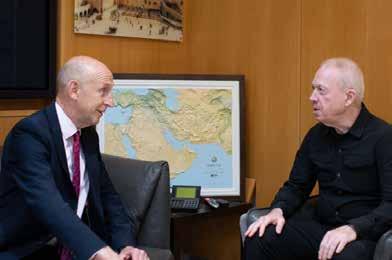


BY ADAM MOSES
The Board of Deputies has met with the leadership at the BBC to discuss concerns relating to the coverage and culture of the broadcaster.
BoD President Phil Rosenberg expressed Jewish community anxieties to BBC Director General Tim Davie regarding institutional antisemitism and institutional-bias against Israel.
Rosenberg addressed the BBC’s refusal to describe Hamas as a ‘terrorist’ organisation, the description of Hamas leader Ismail Haniyeh as a ‘moderate’, presenter Gary Lineker’s social media output and problems within BBC Arabic.
The Board’s delegation included Vice President Andrew Gilbert and Chief Executive Michael Wegier.
Five steps were proposed for improvement including quarterly meetings to ensure progress on issues, faster action for community concerns, an immediate instruction to news teams to ensure Hezbollah and Hamas are described as a ‘terrorist organisation’ and the same description its leaders.
Introductions were sought to BBC decision-makers responsible for content, HR, diversity, the BBC’s new Jewish network and ways to celebrate Jewish staff and contractors within the organisation.
Davie confirmed the BBC would respond to the Board’s proposals in due
course.
Rosenberg noted: “We made it absolutely clear to the BBC leadership about the unacceptable state of affairs, both in terms of content and coverage. We found the BBC team to be open and engaged and welcomed their commitment to consider our proposals. We will judge the Corporation by its actions.”
Rosenberg also visited 10 Downing Street where he discussed community concerns on a number of fronts.
The Board issued a joint statement with the JLC, stating: “We learned that our government will not be pursuing the UK’s original objection to the ICC’s jurisdiction over the current Israel-Gaza conflict. This regretful and regressive step not only appears to be a reversal of long-term UK foreign policy, but also puts us at odds with international allies such as the US and Germany, who have challenged the court’s treatment of Israel.
“This decision comes at a time where many in the Jewish community are still assessing how this government will in practice stand by its words, delivered when in opposition, to support Israel’s right to self-defence. It comes a week after the return of UK funding to UNRWA, despite significant outstanding concerns. It also comes amidst increased reports that the government will soon be making an announcement regarding the sale of arms to Israel, a country which only 300
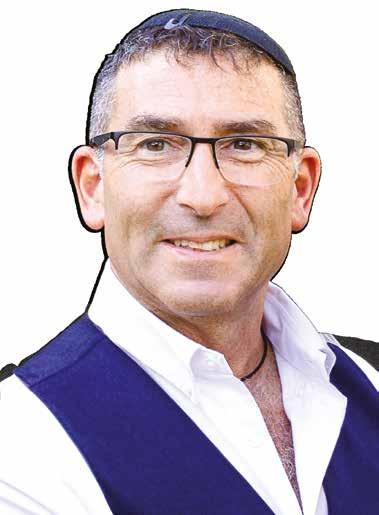
days ago suffered the worst attack on Jewish people since the Holocaust.
“We are concerned that the cumulative effect of these announcements, in quick succession, signal a significant shift in policy, away from Israel being a key UK ally. This would not only be a strategic error but a moral one. The government
should urgently reconsider any such approach.”
Following this engagement, the Government has delayed its announcement on the sale of arms to Israel.
Rosenberg said: “While some challenges remain on the horizon, there was good progress on a number of fronts”.
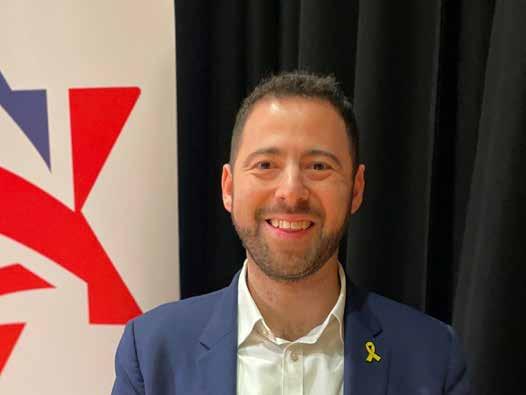


When Jewish schools reopen after the summer break, they will be able to refer to a set of revised and newly produced guidelines on coping after a suicide or sudden traumatic death. The updated guides have been produced for teaching staff and families by the Emergency Response Initiative Consortium (ERIC), co-ordinated by mental health charity Jami, which is part of Jewish Care, in partnership with Norwood, CST, JBCS (Jewish Bereavement Counselling Service), Grief Encounter and PaJeS, the organisation which works in partnership with Jewish schools.
It is hoped that school communities will not experience the suicide or sudden traumatic death of a school student. However, mental health charity, Jami, which supports young people and adults whose mental illness and distress makes everyday life a struggle, wants to ensure that teaching staff and families have the right tools and are supported to respond in the most effective way.
The revised and improved edition of Coping After Suicide or Sudden Traumatic Death: A Guide for Schools, first produced in 2020, is now easier to navigate, featuring graphics and clear key messages. It has been peer reviewed
by Dr Gemma Handelsman, Educational Psychologist, who regularly consults with PaJeS, along with wellbeing specialists from Jewish schools.
The new Essential Checklist for Schools, highlighting key actions to be taken after news of a suspected suicide, will enable teaching staff to react efficiently and effectively in the event of a critical incident. To help families support their children at this difficult time, ERIC has also created a leaflet entitled Helpful Conversations After News of a Suicide, which includes tips for talking to your young person and signposts relevant services for further support.
Within the guides, there is also clear advice for getting in touch with the first response team, all of whom are members of the charities within the Consortium and have received gold-standard First Responders training.
Philippa Carr, Senior Mental Health Education and Suicide Prevention Manager at Jami, which is part of Jewish Care, said:
“All the charities that have come together to work as the Emergency Response Initiative Consortium feel that the new guides will give school communities the added support they need at a very difficult time.
“We know, according to academic research, that it is better for schools to be prepared as this can help prevent suicide. Working with PaJeS, we will be able to get this information into the hands of every leader at Jewish secondary schools. I would also encourage every school to attend our free twilight sessions which start again in September, to be better acquainted with the subject and use of the guides.”
Julia Alberga, Wellbeing Manager at PaJeS, said: “We welcome the revised ERIC guidelines for schools and students. The guidelines are fully comprehensive – from an essential checklist for schools to a full guide that breaks down communication methods, support networks, mental health training and suicide prevention procedures. The ERIC plan helps to ensure the psychological safety of students and helps the school handle a difficult situation with the necessary sensitivity. It also reassures school staff that they are responding correctly. Additionally, the new leaflet for families offers crucial support and tips for caregivers and their children, and points them to relevant resources.”
Jayne Abbott, Resilient Schools Manager at the London Borough of Barnet, said:
“Jami’s ERIC guide provides clear guidance for schools to plan their response to a critical incident in their setting and be able to support their community quickly and effectively after a suspected suicide.”
From September 2024, Jami is also offering one-hour twilight sessions to teaching staff to introduce them to the guide and explain it in more detail. The next twilight training for teachers on the guides will be on Wednesday 18 September and can be booked directly from Jami’s website at jamiuk.org/eric/
All guides can be requested directly from Jami at education@jamiuk.org.uk If you or someone you know are affected by the subjects explored in this article, please get support by either speaking to your GP or accessing help via any of the following services, including: Samaritans on Freephone 116 123 (24 hours a day) or the Jewish Helpline on 0800 652 9249 (12am–12pm, Sunday to Thursday; 12–3pm, Friday)
Shout’s 24/7 crisis text service. Text Jami to 85258 for free, confidential support.
Jami at jamiuk.org/get-support/ or 020 8458 2223


6-bedrooms, detached house only 10 minutes from Ra’anana. Basement and private garden with pool.

5-bedrooms, semi-detached house in the desirable Buchman neighbourhood. 162 sqm built plus option for additional unit with private entrance.

The National Jewish Assembly (NJA) vehemently opposes the recent trends and actions that seek to misuse the term “Islamophobia” to silence legitimate criticism and stifle free speech. This dangerous conflation threatens to undermine civil liberties, freedom of expression, and the foundational democratic principles of our society.
The term “Islamophobia,” often defined vaguely and expansively, is increasingly used to shield Islamist beliefs and extremists from necessary critique. Such misuse not only undermines the fight against genuine anti-Muslim hatred but also poses a significant threat to academic, journalistic, and personal freedoms. This flawed approach risks fuelling the very bigotry it purports to combat by creating an environment of self-censorship.
Gary Mond, Chairman of the NJA, asserts: “While we unequivocally condemn violence against Muslims and acknowledge the need to tackle anti-Muslim hatred, the misuse of ‘Islamophobia’ to suppress legitimate criticism is deeply concerning. This practice effectively institutes a backdoor blasphemy law that stifles essential discourse. Civil liberties must not be sacrificed in the pursuit of combating anti-Muslim prejudice.”
The NJA is alarmed by the potential
misuse of allegations of Islamophobia to protect harmful practices and ideologies that contradict British values. This trend has already manifested, with accusations being wielded against those opposing religious segregation in education, the hijab, halal slaughter, LGBT rights, and counter-extremism initiatives.
Existing laws already offer sufficient protection against attacks based on religion, rendering new, overly broad definitions redundant and counterproductive. Such definitions risk protecting harmful practices from scrutiny and criticism, which are essential in a democratic society.
The NJA strongly urges the government, political parties, and local councils to reject any measures that misuse “Islamophobia” to stifle free speech. Instead, efforts should focus on addressing anti-Muslim hatred through existing legal mechanisms that do not compromise the principles of free speech and open debate.
The NJA also highlights the hypocrisy of those who decry criticism of Islamic practices while ignoring or downplaying the persecution of religious minorities in Muslim-majority countries. This selective outrage undermines the credibility of those advocating for expansive definitions of Islamophobia.
Start your year of learning as you mean to go on, by signing up for The London School of Jewish Studies (LSJS)’s Elul programme, which is the ideal way to get ready for the High Holy Days.
The programme features courses and events with top educators including a class on The Essence of Teshuva with S&P Senior Rabbi Joseph Dweck and the Transformative Texts of the High Holy Days with Dr Tanya White, senior lecturer at Matan and a Sacks Scholar.
Rabbi Joseph Dweck will be examining the concept of Teshuva and analysing key sources to argue that its essence is about structuring our life around mitzvot. Dr Tanya White’s three-week online course will focus on our relationship with G-d, teshuva through prayer and the meaning of life. By using classic and contemporary Torah commentaries as well as modern, philosophical and psychological thought, the course will uncover novel insights to provide a new-found appreciation of the High Holy Days’ texts.
our Sages instituted a minor fast immediately after Rosh Hashanah. The Incongruous Fast: What does Gedalia have to do


Joanne Greenaway and Dr Yosefa (Fogel) Wruble will be examining How can we face it (Simchat Torah) again?, in a special event on 23 September, which explores the Machzor and the Tanach to ask how we can prepare ourselves for the High Holy Days in light of the tragedies we experienced this year.
The special events will conclude with Rabbi Dr Raphael Zarum asking why
with Repentance?, on 6 October, will look at what Gedalia’s story can teach us about Israeli politics and our hopes for the future at this difficult time.
LSJS will also be hosting the UK launch of Gila Fine’s new book, The Madwoman in the Rabbi’s Attic: Rereading the Women of the Talmud. Rabbi Dr Raphael Zarum will take part in an online conversation with Gila to discuss her new book on the six named heroines of the Talmud. Attendees will be able to purchase discounted copies of the book at the event.
There is also a special series of LSJS’ popular free Covenant & Continuity weekly class on Rabbi Sacks’ thought, attended by students from around the world. For Elul, the course will be switching from the weekly parasha to looking at Rabbi Sacks’ ideas on the High Holidays, developed by educators who were his students. Join Rabbi Alex Israel, Rabbi Gideon Sylvester, Dr Lindsay Simmonds and Michael Rainsbury for this special four-week course.
“We know that many people are looking for Jewish ideas that are profound, true to tradition and in harmony with our modern lives. Our Elul programme will give you fresh approaches to make the High Holy Days meaningful, while tackling the specific challenge of how we face Simchat Torah, one year on since 7 October,” said Michael Rainsbury, LSJS’ Head of Adult Education.
“We are proud to be providing such a high-calibre Elul programme to the community and hope it keeps going from strength to strength each year,” said Joanne Greenaway, Chief Executive of LSJS.
Please note: The views of the letters do not necessarily reflect the views of this newspaper. Letters may be edited and publication is at the discretion of the editor.
Even as we must afford our country’s foremost news organisations some latitude as they unenviably attempt to cover the Israel-Hamas-Hezbollah conflict in real time, I feel compelled to suggest that the reporting of the BBC and Sky News last week strayed beyond all reasonableness.
The horrific week for these two began on 27 July, with a rocket attack in Majdal Shams in the Golan killing 12 children, and the IDF hitting a school in Gaza which, according to Hamas, killed 30. The BBC ran with two headlines which could best be described as chalk and cheese: “Children dead in attack on football pitch in Israeli-occupied Golan”, read one. “Israeli strike on Gaza school killed 30health ministry”, the other.
Many questions jump to mind. The BBC say the former incident was an “attack” which merely left “children dead”, the latter an “Israeli strike” which “killed”
30 people. There was room to report that the rocket hit the “Israeli-occupied Golan”, but no such room to state that the “health ministry” source in Gaza is run by Hamas. No mention either that the rocket hit a playground, yet it is suggested Israel struck just an ordinary, functioning school in Gaza. As Lord Wolfson put it, “Israel appears in both headlines, striking and occupying”.
If the above can be dismissed as classic licence-payer nitpicking, I suggest what happened next cannot. On 29 July, the BBC’s International Editor, Jeremy Bowen, wrote that while Hezbollah’s denials were unconvincing, it was “hard to see why it would target Druze children at a football match”, and Hezbollah “might have been aiming for the extensive Israeli early warning stations on military positions on Mount Hermon”, in line with Hezbollah’s apparent aims of “mostly… trying to kill soldiers, not civilians”.
All three of these points are torn apart when one recalls that this was a rocket - of which Hezbollah (like Hamas) have fired hundreds into Israeli territory. These rockets are not precision weapons. They
are lobbed over land borders, aimed at a wider vicinity, but without any particular “target” that Bowen seems happy to speculate on, and in flagrant breach of international law maxims that Bowen doesn’t once mention. His caution here stands in direct contrast to his speed in suspecting Israel carried out the Al Ahli Hospital blast on October 17th, while the IDF were still denying it and investigating (Bowen later admitted he got it wrong, but said he “didn’t regret one thing” about his reporting that night).
The same day, Sky News’s Special Correspondent, Alex Crawford, also appeared to give Hezbollah the benefit of the doubt, reporting its denials with more conviction than scepticism. She even went as far as uncritically repeating a claim from Hezbollah that the attack was a “precursor to allow Israel to attack Lebanon”. Crawford then wrote online that in the aftermath, Israel would be pressured to “reign in their lust for revenge”. When challenged on this, she replied that her team would change the phrase to “lust for revenge as demonstrated over the last 9 months”, before audaciously taking a dig at his own partiality.
I suspect one would think, at this point, that it could barely get much worse. The death of Hamas political leader Ismail Haniyeh, on 31 July, however, was a shock beyond all proportions. Crawford and Sky, Bowen and BBC, as well as Reuters and the Guardian, described Haniyeh variously as someone seen as a “moderate” and “pragmatic”, “less hardline” leader of Hamas, and a key leader of efforts to negotiate a ceasefire.
It is difficult to explain how one can be seen as the more “moderate” face of an internationally proscribed terrorist
organisation he himself leads - yet somehow our most trusted journalists managed it. A moderate leader does not help mastermind and sign off on a mass terrorist attack on Jews, and celebrate live footage of it from the comfort of his hotel suite in Qatar. A moderate leader does not engage in efforts to end a war that his group not only began but persists with to this day, with rockets still fired and hostages still held. A moderate leader is not recently filmed leading supporters into a rousing rendition of “Khaybar Khaybar ya Yahud”, together with calling for the destruction of Israel, both genocidally antisemitic aims of Hamas (whether in its 1988 charter or its watered-down 2017 addendum). A moderate leader does not state that “the blood of the children, women and elderly” must be sacrificed for the Palestinian cause. I have no space left to mention all his other absences of “moderation” - but you see the point. So, over a 5 day period, we saw a senior Sky News correspondent refusing to give the benefit of the doubt to Israel’s painfully precise and defensive actions, and a senior BBC correspondent affording that very same doubt to Hezbollah, whose actions are neither defensive nor precise. After Haniyeh, we are then left wondering if our two largest news organisations have descended almost irrecoverably into farce. But by taking a little time to complain (viewerR@sky.uk, and www. bbc.co.uk/contact/complaints), we can at least signal that enough of us were paying attention.
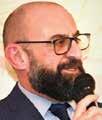
BY STEVE WINSTON
The recent decision by the Labour government to impose a secret arms embargo on Israel as Iran readies a major assault is not just a diplomatic blunder; it is a perilous act of betrayal. This policy, born out of a misguided desire to appease the anti-Israel left, endangers the security of both Israel and the United Kingdom, emboldens Tehran and its proxies, and tarnishes the UK’s standing on the global stage.
The timing could not be worse. Iran’s permanent mission to the UN has openly declared that Hezbollah will soon strike deep into Israel, targeting civilians. Such overt threats of war crimes should be met with unwavering support for the victim nation, not a halt in arms exports. Labour’s actions effectively signal to terrorist organisations like Hamas and Hezbollah that their violent strategies are endorsed by the international community, undermining the moral clarity that should define British foreign policy.
The UK’s Defence Secretary, John Healey, and the Chief of the Defence Staff,
Admiral Tony Radakin, recently returned from Israel, where they were briefed on the realities on the ground. Despite this, Labour seems more intent on mollifying its anti-Israel faction than standing by a key ally. This stance is not just morally indefensible but strategically reckless. Freezing arms sales during wartime implies that Israel is committing war crimes—a narrative that Labour’s leaders know to be false.
Labour’s recent policy shifts, including restoring funding to UNRWA and dropping the previous government’s objection to the International Criminal Court’s plans to issue arrest warrants for Israeli leaders, highlight a dangerous trend. These actions undermine Israel’s right to self-defence and embolden those who seek its annihilation. The pause in licencing and withholding military radios and body armour is an egregious move that endangers Israeli soldiers and civilians already under threat from Iranian proxies. The Labour government’s naivety is starkly evident in its call for an immediate ceasefire, which would only ensure Hamas’s survival. This, coupled with their advocacy for unilaterally recognising a Palestinian state, rewards terrorism and undermines genuine peace efforts. The
notion that appeasing Iran and its allies will lead to peace is a dangerous delusion. Iran and its proxies do not operate under the same moral or political frameworks as Western democracies; they exploit perceived weakness and respect only strength.
The ramifications of Labour’s actions extend beyond Israel. Undermining a critical ally weakens the UK’s own national security. This appeasement of Iran invites further aggression not only against Israel but also against other friendly nations in the region. Such a posture could inspire greater extremist violence, including within the UK itself. Strong, unequivocal support for our allies and a hard line against our enemies are essential to containing violence both abroad and at home.
Labour’s foreign policy appears to be driven more by a need to placate its anti-Israel supporters than by a commitment to uphold international law and support democratic allies. This approach is not only misguided but dangerous. Labour must reverse its course immediately. It should unequivocally support Israel, restore the arms trade, and stand firm against Iranian aggression. Only through moral clarity and steadfast
support for Israel at its hour of need can the UK hope to repair the damage caused by this horrendous foreign policy misstep. The National Jewish Assembly (NJA) stands resolutely with Israel during this critical time. We recognise the importance of providing full support to Israel’s efforts to defend itself against escalating threats. Labour’s stance not only endangers Israeli lives but also sends a perilous message to our adversaries that the UK is retreating from its commitments to its allies.
In the final analysis, Labour’s actions are a perilous flirtation with moral equivalency and appeasement. This is a time for Britain to demonstrate unambiguous support for Israel and to confront Iranian aggression with the resolve it demands. The stakes are high, and history will not look kindly on those who choose the path of least resistance in the face of tyranny.
Winston is the Managing Director of the National Jewish Assembly
Pinner United Synagogue has appointed Rabbi Jason and Rebbetzen Elise Kleiman as their new rabbinic couple.
The couple were overwhelmingly voted in following a Shabbat spent with the community.
Rabbi Klieman led Beth Hamidrash Hagadol Synagogue in Leeds for two decades after rabbinic roles at Reading Hebrew Congregation, Catford & Bromley United Synagogue and Clayhall United Synagogue (now Cranbrook United Synagogue).
The Leeds-born Rabbi holds a BA in Theology and Religious Studies and received Semicha from the late Chief Rabbi Lord Jonathan Sacks from Jews’ College in 1997.
Rabbi Kleiman, known for his interfaith work, has worked with Leeds Jewish Free School, Brodetsky Jewish Primary School and Leeds Jewish Education Authority. He is a Jewish chaplain to Leeds Hospitals NHS Trust and Honorary Chaplain to the 22nd North Leeds (Hillel) Scouts.
A graduate in Business and Finance, Hull-born Rebbetzen Kleiman, taught at the Brodetsky and Menorah primary schools, having previously worked as an accountant and as a civil servant for The Intervention Board.
The Kleimans, who have three sons, run the community cheder for the Education Authority, Rabbi and Rebbetzen Kleiman said in a statement: “After 19 years in Leeds for which
we have a very deep affinity, a move to a new community would have been tremendously daunting were it not for the infectiously warm and welcoming reception we experienced when visiting Pinner Shul. We embrace the opportunity to lead such a vibrant congregation, alongside so many inspirational members who actively contribute to all aspects of shul life. Building on the principles of ‘Inspire, Care, Connect’ articulated by our predecessors Rabbi and Rebbetzen Kurzer, we are passionate about reaching out to the Pinner community and look forward to enhancing each person’s connection to their faith, their community and the State of Israel.”
Lisa Olins, Pinner Chair, said: “I am very excited to welcome the Kleimans to Pinner in early 2025 and look forward to working with them for the enhancement of our wonderful community.”
The Kleimans replace Rabbi Ben and Rebbetzen Abi Kurzer who moved to become the Senior Rabbinic Couple at Golders Green United Synagogue in May.
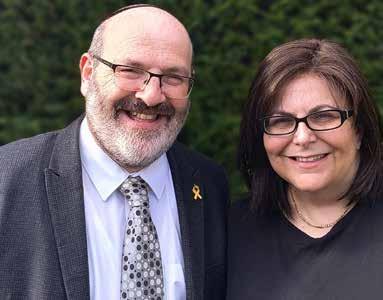
The Jewish Family Centre has launched its Child Contact Centre which will open in September.
The state-of-the-art facility features dedicated rooms for children and teenagers.
There is no other Jewish facility in the UK and the JFC has enhanced accreditation with the National Association of Child Contact Centres.
The launch event will bring together Family Law professionals, including solicitors, mediators
and barristers, to showcase the centre’s unique offerings.
Sandy Weinbaum, JFC CEO said: “Our goal is to provide a safe, supportive space where children and families can maintain essential connections during difficult

times. This centre is a testament to our commitment to family wellbeing.”
The centre boasts specialist rooms to cater to distinct needs of different age groups. These spaces ensure children and teenagers feel comfortable and secure during visits. Cameras are fitted in each room and space is available for trained supervisors if required.
A young adult who visited the Centre, commented, “I wish there had been a place like this when my parents got divorced. A place like this would have made it so much better.”

Natascha Lieberman, Contact Centre Manager, noted, “Our facility is unique in its approach to catering to children and teenagers, recognising each group has specific needs. Family Law professionals can see first hand the exceptional environment we’ve created at the launch.”
The evening includes a tour of the facilities and opportunities for Family Law professionals to engage with the JFC team.
JFC is dedication to supporting families and strengthening community bonds. The organisation aims to establish itself as the premier choice for court-mandated contact sessions.
Leeds Zionist Initiative is combatting antisemitic and antizionist vitriol at Palestinian Solidarity Campaign demonstrations.
Since October 7, Leeds has been subjected to weekly PSC demonstrations where speakers have spouted blood libel, used Holocaust inversion and attempted to turn the word Zionist into a pejorative term.
LZI took to the streets of Leeds in April to counter-protest. Since then, they have been joined by people of all faiths. LZI is now calling for more people to join them.
Sam Morein, an LZI founder, said:
“While our numbers have grown, we are outnumbered by PSC protesters. We are there to make sure the hostages are not forgotten, to protest about the levels of antisemitism and to fight for the right of the State of Israel to exist. We have a very good relationship with West Yorkshire Police, we let them know when we will be attending and keep a safe distance from the PSC.”
LZI objectives are to promote Zionism, monitor PSC rallies and counter fake narratives promoted by the PSC and counterparts.

MedEx is brought to you by the International Medical Aliyah Program (IMAP)
This unique event provides doctors and medical students with the opportunity to meet with representatives from across the Israeli medical establishment.
MedEx is the only place where you can:
• Have your documents certified in person
• Begin the process of transferring your
• Interview with Israeli hospitals and medical clinics
• Discuss your Aliyah plans
– all under one roof!
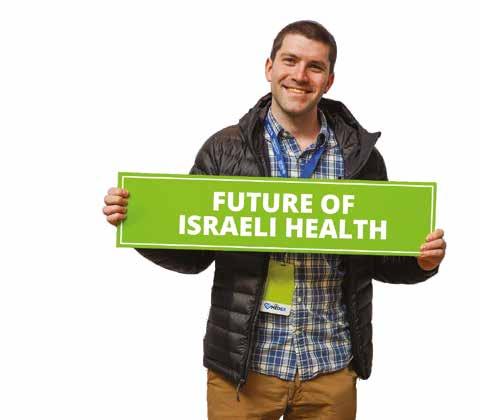






BY REBBETZEN ELISHEVA NEWMAN
Two of the most significant events in the Jewish calendar both conclude with the same phrase. When the prayers of Yom Kippur draw to a close, and when we reach the final section of the Pesach Seder, we cry out in hope and yearning: “Leshana haba’a biYerushalayim habenuya, - next year in Jerusalem rebuilt.” Why?
Both of these moments are ones of closeness and heightened awareness of G-d. On Yom Kippur we remove the physical barriers that sometimes distract us from the spiritual part of ourselves so that after an entire day of fasting, prayer and introspection, our commitment to G-d is at its strongest. At the Seder,
we strengthen our faith by reliving our nation’s birth, our continuous miraculous existence and our unique mission. Perhaps our longing for the Beit Hamikdash to be rebuilt is specifically expressed at these points because we don’t want these moments of heightened connection to be just that - moments. We yearn for a time when we can always feel that closeness; for a world where G-d’s glory will constantly be evident in the most magnificent way and the whole world will recognize that He is our Creator. For the day when, as we say at the end of Aleinu, “G-d will be One and His Name will be One”. What does that phrase mean, exactly? What’s the difference between G-d and His name? One approach could be understood through an analogy of a human king. When one is in the palace of the king, it’s easy to feel his presence. There’s a certain awe and reverence, evident in people’s calculated speech, considered
actions and mindful etiquette. Here, the king’s presence is tangible! But in the rest of the country, the presence of the King is very different. He rules ‘by name,’ through his officials. Consequently, some people become unaware of the king’s true authority. What we long for at these points in the year, and particularly now as we approach Tisha B’av, is for the whole world to be the King’s palace! When Jerusalem and the Beit Hamikdash are rebuilt, G-d’s name will be One and His presence will be universally recognized and palpable. When Yeshaya prophesized about the era of Mashiach he describes, “The world will be filled with the knowledge of G-d, as the waters cover the sea.” This language seems very strange: How can water cover the sea? Isn’t the sea itself water? Rabbi Leff, in his book on the Shemoneh Esrei, explains this analogy as follows: although the sea contains countless creatures, plants and minerals, when one looks at
the ocean, it is the water that first catches people’s attention. Similarly, in the time of Mashiach, although many things will make up the world and occupy its inhabitants, one overwhelming, all-encompassing pursuit will capture everyone’s attention – the knowledge of G-d! For this, we mourn, yearn, and hope. Yet, we do more than yearn and hope! Each and every day we have countless opportunities to bring G-dliness into the world. Every one of our actions may have the effect of either raising or lowering other people’s awareness of G-d and their esteem for Him. Whilst we long for a time when G-d’s glory is obvious and tangible to all mankind, we strive to reveal this to the world with choices and actions that increase His honour.
Rebbetzen Elisheva Newman is an Aish and FJL Educator
While many teenagers started their summer relaxing, 16 dedicated Year 10 girls joined GIFT, choosing a different path, spending three action-packed days in Brighton on a volunteering trip focused on giving, learning, and personal growth.
The trip was designed not only to provide hands-on volunteering experience but also to educate the girls about the importance and impact of giving. Despite the jam-packed schedule, the girls also had time for fun, enjoying a well-rounded and enriching experience.
Over the three days, the girls participated in a variety of activities aimed at supporting and understanding the needs of different community groups. Highlights included volunteering at a Half-Way House where the girls assisted residents with severe mental health issues, offering support and companionship. The girls took on litter picking at Brighton beach, helping keep Brighton’s public spaces clean and inviting for everyone. They also
assembled care packs for homeless individuals and personally delivered them, engaging in meaningful conversations to better understand their lives and challenges.
Before each activity, the girls received educational sessions to deepen their understanding of the issues at hand. For instance, prior to their homeless outreach, they learned about homelessness and the importance of treating each person as an individual, fostering empathy and respect.
The trip also included time for fun and bonding, with an enjoyable visit to Brighton Pier and a memorable BBQ evening.
Chaya Necha Milun, the trip leader and a high school educator at GIFT, expressed her pride in the girls’ commitment and growth: “For me, this is a truly inspirational trip. Learning with the girls, doing the activities, and watching them grow, change, and become kinder and more caring makes it a privilege to be part of this trip. This is what GIFT is all about!”
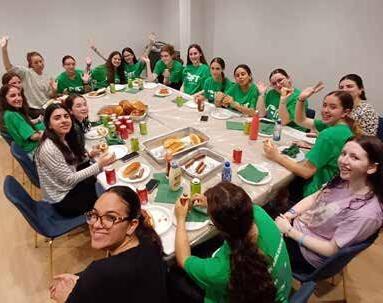
Ella Adelman from Hasmonean Girls’ School participated in the trip and shared her thoughts, saying, “It was an enlightening experience that I would do time and
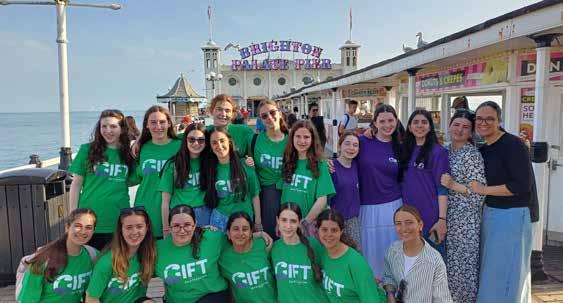
time again.”
The Brighton trip exemplifies GIFT’s mission to educate and inspire young people to give and make a positive impact in their communities. Through these experiences, the girls not only
contributed to various causes but also developed a deeper appreciation for the value of giving and the power of kindness. For more information about GIFT and their programmes, please visit www.jgift. org



“Explore. Dream. Discover.” - Mark Twain
Israeli Airline Arkia recently announced the inclusion of Manchester to their schedule as it will operate two flights per week to Ben Gurion Airport, scheduled for Mondays and Fridays, starting 14 October 2024.
This announcement comes at a time when the region calls for the support of the Jewish community in the UK to visit Israel, as an unwavering sign of support to the communities affected by the war with Hamas.
Michael Ben Baruch, Director UK & Ireland, Israel Government Tourist Office:
‘This is great news for the Jewish community in Manchester and wider UK. I meet many Israel supporters and Jews who express their desire to visit Israel during these times, with the understanding that their visit is particularly significant right now. It is an opportunity for visitors to show their support for Israel and play an active role in the rebuilding of communities and individuals in Israel.
‘In addition to enjoying the wonderful experiences Israel has to offer, it serves as an opportunity for visitors to feel inspired by the resilience Israeli society
has demonstrated while dealing with this challenging moment in history.
‘So, the fact that those living in Manchester and the surrounding areas can do so with ease - thanks to the introduction of Arkia’s direct flights from Manchester twice weekly -is welcomed with great enthusiasm.’
Liat Bell Sommer, Head of Communications and Government Relations at Arkia Airline:
‘We are delighted to launch the new route from Manchester to Israel with two flights per week. These are times when
With stunning and varied landscapes ranging from verdant hills to golden desert mountains and valleys, and a well-developed hiking and national parks infrastructure, you can always find a romantic and quiet spot amidst the picturesque nature for a special quality time with your partner on Tu B’Av. In fact, there are so many beautiful places that you don’t have to limit yourself to just one day a year! Here’s a selection of some of the most attractive and romantic scenic lookouts to share with your beloved.
For those who appreciate the raw, stark desert landscape, there is no better place to contemplate its beauty than along the Ben Gurion Promenade, which stretches for 3.5 km. The stroll begins from the tomb of Israel’s first prime minister David Ben Gurion and his wife Paula, and takes you past breathtaking views of Nahal Tzin and Ramat Avdat. There are five shaded resting points and overlooks where visitors can sit and soak up the endless landscape and the infamous desert stillness.
see the Carmel Mountains. The National Water Carrier crosses the valley, which partly floods in winter. The Yodfat Ridge, which rises on the other side of the valley, contains the remains of the ancient city of Yodfat.
With stunning landscapes, coastline, and a variety of hospitality and culinary options, Gilon Ridge is the perfect place for a romantic weekend or hike. Nowhere is more beautiful than the solitary bench atop the ridge, somewhere between Acre and Karmiel. The Gilon mountain ridge offers several scenic hiking trails, with views across the Beit HaKerem valley, the Nahal Hilzon basin, the Acre valley all the way to the sea, and the spectacular Tzur ridge. At its foot is the Nahal Shagur Nature Reserve, where you can cross the bridge over the deep stream in the Beit HaKerem Canyon. So, whether you’re hiking or just looking for a solitary and romantic spot in the mountains, head to that special bench!
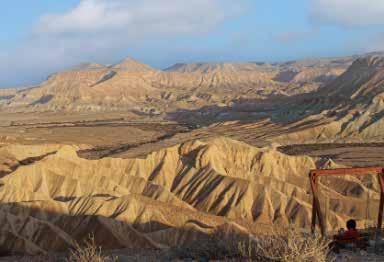
Lowdermilk Scenic Lookout, Tur’an Ridge
For a breathtaking view of the Beit Netofa Valley, head to the accessible Lowdermilk Scenic Lookout, named after Walter C. Lowdermilk, an American geologist who initiated the idea of building a water reservoir in the Beit Netofa Valley. Look east and you can see Mount Canaan; look west towards the sunset, and you can
the Jewish community around the world seeks to visit Israel and show support through their presence, so we are pleased to introduce an offer that will make it much easier for those in Manchester and the surrounding areas to do so. We anticipate great demand from this community.’ Arkia flights from Manchester Airport to Ben Gurion Airport start from 14 October. Bookings can be made via the normal online flight search engines.
One of the most photographed and tagged spots on social media for a romantic photo-op, visit “Kodenzik Land,” named after Ziv Kodenzik, who designed the place. It features a solitary wooden bench with a breathtaking view. Of course, the best time to come is at sunset. Access to this romantic spot is by car, a short drive along the kibbutz perimeter fence, near the tourist complex and hotel. You can also take an easy and leisurely walk to the Marom Golan Reservoir, located at the foot of the lookout. Just
remember to bring warm clothes, a bottle of good wine, and a camera.


Beauty, solitude, and heritage converge at this romantic spot in Gush Etzion, just a 15-minute drive from Jerusalem. At an altitude of 900 meters, you can enjoy the biblical landscape of the region, with its terraced hills, and look down at the path that the Patriarchs and pilgrims would have walked on their way to Jerusalem. There are five benches in total, all perched on the top of a cliff, with views of Nahal Naaman, the Judean Mountains, the lowlands, and even the Mediterranean Sea. In summer, the light breeze will be a welcome respite from the heat, and in winter, you may even get to see the landscape blanketed in snow. This romantic spot is located between the communities of Neve Daniel and Elazar in Gush Etzion, accessible by car on a marked trail.




for a bespoke Kosher holiday that meets all your tailored needs? Discover your perfect Kosher getaway with Bespoke Kosher Travel! Our experienced team specialises in creating customised holidays that meet your every Kosher requirement From remote destinations to popular tourist spots, we've got you covered

At Global Vacations we are a team of dedicated staff who are passionate about travel. We have been in the hospitality business for over 10 years, where we take great pride and effort in our customer service, ensuring your holiday needs are met. So why not explore and enjoy the ultimate summer holiday Alp experience at our 4 star Kosher Hotel in Val Thorens!
WHERE IS THE KOSHER HOTEL
Val Thorens is a ski town in the Tarentaise Valley in the French Alps at an altitude of 2,300 m (7,500 ft). It is located in the commune of Saint-Martin-de-Belleville in the Savoie Region. The resort forms part of the 3 Valleys ski area which, with over 600 km of slopes, is one of the largest linked ski areas in the world. In the summer, in Val Thorens, a highly popular resort, there’s something for everyone. Amongst the many activities, there is : bike park, chair lifts, horse riding, kayaking, archery, trampolining, tennis, pedal boat, water sports, breathtaking hiking, cable cars and much more. Who would say that summer in the mountains is only for relaxing! For the more daring, it’s time to spice up with a paragliding flight over the lake and mountains, mountain climbing, mountain biking, white water swimming, small plane rides, white water rafting, etc. So either alone or with friends and family, it’s time to create and discover an unforgettable holiday experience!
Situated in the heart of the village of Val Thorens, this 4**** hotel, Hotel Arolles, has a modern alpine feel. The hotel has plenty of charm, is spacious and situated in a great location, that ensures both the slopes, and the exciting outdoor activities, are within easy reach. It is only meters away from cable cars and the main chair lift which will whisk you up to the vast breathtaking Val Thorens summit! The Hotel itself offers multiple facilities in a friendly & relaxed ambiance that will include 5***** Kosher gourmet cuisine by the renowned exclusive caterer Ushi Brecher and his team - under the Glatt Kosher Kashrus authority of Harav Mordechai Rottenberg Shlit’a - Rav of Kehillas Hachareidus of Paris - Mashgiach on premises full time. The hotel also boasts a comfortable Shul, spacious relaxing lounges, cocktail bar, spa - jacuzzi, hammam, sauna, exciting all day kid’s club, evening entertainment, 24 hour tea & cake bar, and vast outdoor
spaces where one can simply unwind & relax amidst the pristine air and magnificent scenery! The rooms at the hotel are tastily designed with a warm decor giving them a modern cozy feel, with each room having a private bathroom and stunning mountain views.
WHAT TYPE OF ROOMS DO YOU HAVE?
We have a choice of Twin/Double, Triple or Family rooms sleeping 2, 3, 4, 5 or 6 persons
The Family Rooms are interconnecting offering secure access for parents and children, with 2 bedrooms and 2 bathrooms.
All rooms have magnificient views!
WHAT ENTERTAINMENT DO YOU HAVE FOR THE FAMILY?
We have free kids club every morning for 3 hours to entertain your kids with a dedicated team of English speaking Heimishe girls to daven and make the most amazing arts & crafts, and play games with them.
We will be showing a select choice of kosher childrens films.
For the adults we have shiurim, live concerts, ladies films etc.
WHAT ARE YOUR DATES?
WHAT DO PRICES START FROM?
We offer 5 star catering full board from €100 per person per night!
HOW FAR IS VAL THORENS FROM GENEVA?
Just over 2 hours drive.
HOW DO I BOOK A STAY?
Just call or whatsapp on +44 020 8809 9520 or email info@globalvacations. co.uk
WE ARE LOOKING FORWARD TO SEEING YOU THERE!!!


8 August to 2 September
HOTEL SERVICES:
5***** Kosher Gourmet Cuisine
Glatt Kosher Lemehadrin - Rav Mordechai Rottenberg Shlit’a
Therapeutic Spa, Jacuzzi, Hammam, Sauna
Rich Breakfast Buffet - Exclusively up until 1pm
Exciting Kids Club / Baby sitting service (all day)
Shiurim
24 hour Tea & Cake Bar
Entertainment Cocktail Bar
Free Wi Fi
Laundry Room
Thursday night Kumzitz - with Kugel / Cholent & Cold beverages
Shul - Open 24 hours for Davening & Learning
Tastefully designed modern rooms with mountain views
Parking
Stunning breathtaking scenery
Hotel Shop (Nosh - Ice Cream - DrinksFresh Pizza)
Relaxed, friendly & Heimish atmosphere
Personal care by dedicated staff
Spacious lounges





The Pesach programme at Brighton’s Jewish Community Hub (BNJC) concluded with resounding success, leaving guests with an unforgettable experience, truly encapsulating the spirit of togetherness, tradition, and joy. BNJC’s commitment to revitalise Jewish life in the vibrant seaside town of Brighton & Hove sets the bar high for all-inclusive Pesach experiences in the UK and beyond.
From the moment guests stepped through the door, they were greeted with a sense of belonging and excitement. The all-inclusive stay provided families with an opportunity to observe Pesach while enjoying a relaxing seaside trip. BNJC’s holiday let accommodation ranges from five-bed, four-bathroom town houses to two-bed, two-bathroom apartments, including penthouses with beautiful views of the sea and views of the South Downs.
The spacious and contemporary Kosher-for-Pesach accommodation offered guests a comfortable and stylish home away from home. With a daily cleaning service for ease, a private car park, and on-site facilities such as the gym and co-working space, families were able to unwind and make full use of everything BNJC has to offer.
Delicious catering by the on-site restaurant Novellino Brighton took centre stage. Under supervision of the KLBD and leadership of Israeli award-winning Chef, Yanir Mrejen, the Mediterranean
style menus left taste buds tingling and bellies satisfied throughout the programme. From traditional dishes like matzo-brei to modern delights like shakshuka and mixed grills, each meal became a celebration of flavours, with a standout BBQ night showcasing delicious food that brought everyone together. The Novellino Deli provided a vast selection of Kosher-for–Pesach items for guests to purchase throughout their stay, making daytrips out across East Sussex that much easier and more enjoyable.
Memorable seder nights, led by Rabbi Andrew Shaw from Mizrachi UK, were a highlight of the 8-day festival, framed by storytelling, song, laughter, and a delicious 4-course menu where guests celebrated together on one communal seder table. Throughout Yom Tov, guests also benefited from shiurim by both Rabbi Matt Marks and Rabbi Andrew Shaw. BNJC’s prime location, nestled between the sea and the South Downs, meant that guests were spoilt for choice with a day on the beach, museum visits, and leisurely strolls through the Laines. The programme offered a range of activities that allowed guests to immerse themselves in the cultural and recreational offerings of Brighton & Hove, including trips to Brighton Pier and the SeaLife Centre, Jewish historical walking tours, and a matzah ramble around the city. The highlight, however, was the fantastic
‘Freedom Concert’ by the talented chazan, Johnny Turgel, which swept guests off their feet in a night of music and reflection.
Reflecting on the success of BNJC’s first Pesach programme, Rabbi Matt Marks expressed his gratitude for the overwhelming support and enthusiastic participation of the guests, saying “We are thrilled to have created such a warm and welcoming space for our guests to celebrate Pesach. Our first Pesach programme truly epitomised the spirit of togetherness, tradition, and joy, and we look forward to continuing to provide unforgettable experiences for years to come.”
Pesach guest Rabbi Claude Vecht-Wolf shared his testimonial, highlighting their exceptional experience: “Stephnie and I have spent the most amazing Pesach at BNJC in Hove. Without qualification, it is by far the best programme I have ever experienced.” He commended the inspirational leadership and exceptional programming, as well as the dedicated staff at Novellino and the shul housed within the complex, expressing eagerness to return, “We have already told them that we want to come back next Pesach (and maybe even sooner.)”
put Brighton back on the Jewish map by creating opportunities for the community to come together in the seaside city. What truly set this experience apart was the sense of community and camaraderie that quickly turned guests into one big family. Sharing stories, laughter, and meaningful moments created an atmosphere of warmth and belonging that will

be cherished for years to come. As BNJC looks toward the future, this community hub wants to continue to provide memorable Jewish experiences for all those that walk through its doors. If the success of the Pesach programme has highlighted anything, it’s that the demand for community spaces aimed at bringing people together is at an all-time high.
For more information about BNJC, including events and holiday stays, please
The Pesach programme marks a new chapter for the project, which aims to














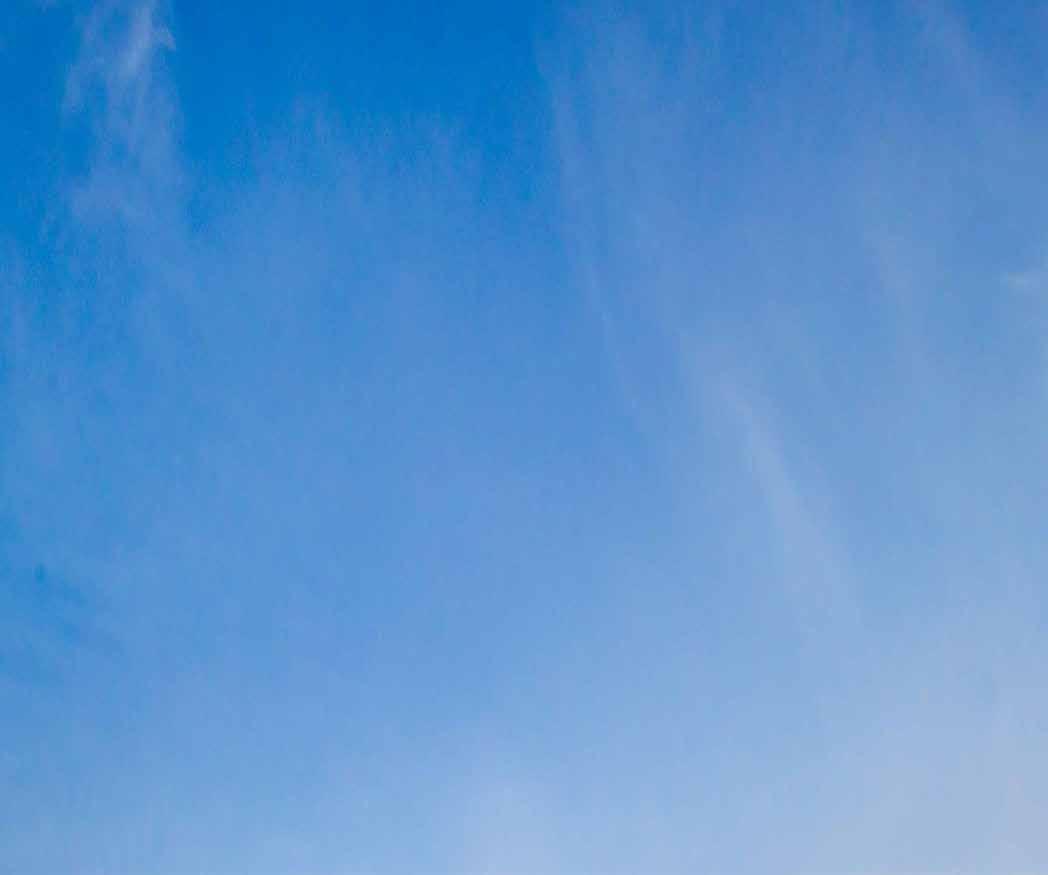





intriguing Dubai & abu Dhabi tour, uae 5-11 November 2024

india the Golden triangle 18-28 November 2024

authentic havana tour, Cuba 05-09 January 2025
treasures of Panama Yeshiva Week 13-21 January 2025
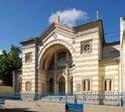

adventure in lapland 19-25 February 2025

Fascinating Japan 05-14 May 2025 & 19-28 May 2025 including The World Expo, Osaka
the ultimate scottish Whisky tour 15-19 June 2025
Jewish heritage lithuania & Poland 20-27 June 2025
antarctica Fly & Cruise 27 January-3 February 2026

african adventure safari: choose your dates
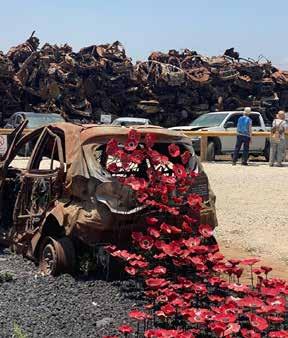
IN-PERSON AND ONLINE PROGRAMMES FROM JEWISH FUTURES

MONDAY EVENING 12 TH AUG
20:27 FAST STARTS
21:00 MAARIV, EICHA AND KINNOS
Followed by הלילב הכבת הכב –feeling the Churban with heartfelt niggunim
21:00 ONLINE EICHA
Followed by HEARTFELT INSIGHTS FOR WOMEN
With Rebbetzins Shalvie Friedman, Miriam Gefen, Yael Roodyn & Adina Strom
22:30 ONLINE PROGRAMME: FEELING THE CHURBAN IN A POST-OCTOBER 7TH WORLD.
TUESDAY MORNING 13 TH AUG
08:30 SHACHARIS AND KINNOS WITH EXPLANATIONS: SHARING OUR PAIN
Followed by "B'TZELEM ELOKIM": A SHOCKING REALISATION AT THE EICHMANN TRIAL
Optional talk by Rabbi Yaakov Klein
11:30 WOMEN'S PROGRAMME
Led by Rebbetzin Shalvie Friedman
13:05 HALACHIK MIDDAY
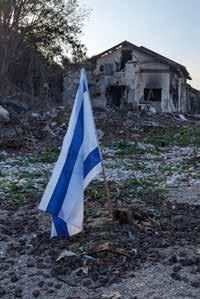
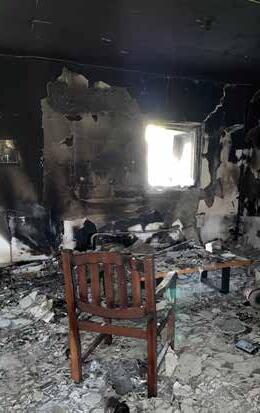
TUESDAY EVENING 13TH AUG
18:15 UK PREMIERE (IN-PERSON SCREENING):
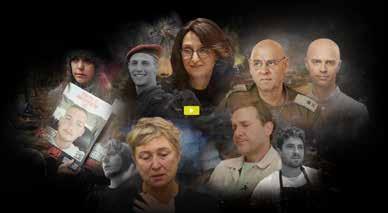
OCTOBER 7 TH VOICES OF PAIN, HOPE AND HEROISM
With concluding words from Rabbi Naftali Schiff
19:45 ONLINE: SCROLLS OF FIRE: THE HIDDEN BOOKS OF THE HOLOCAUST
Rabbi Yonasan Roodyn
20:00 MINCHA
20:30 "WHERE DO WE GO FROM HERE?"
Rabbi Daniel Rowe introduced by Rabbi Naftali Schiff
21:05 MAARIV
21:13 FAST ENDS & REFRESHMENTS
jfutures.org/9Av | All in-person programmes at 154 Brent Street, NW4 Separate seating. Fully air conditioned.













Fresh Milk
Fresh Bread
Yogurts & Cheeses
Salamis & Dips
Groceries & Nosh
Grape juice & Wines
Newspaper & Magazines






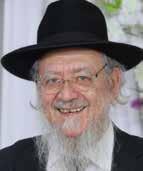
BY RABBI YAKOV SCHONBERG
Bava Basra 39b discusses squatters’ rights: one who squats on land for three years is assumed to be the owner of the property and needs no longer preserve a deed of purchase in order to validate a claim of title. To prevent the squatter from being able to claim ownership by dint of his physical presence on the land, the person previously in possession of the property must issue a formal protest, which breaks the contiguity of the three years needed by the squatter. Such protest is sufficient to negate the claim of the occupant with the result that, unless the squatter can produce a deed, title is awarded to the prior owner. An owner must lodge the protest in front of sufficient people to ensure that it will reach the occupant – namely, three people. The gemora derives this from rechilus, a prohibition that only applies if the person hearing the information would not have heard it otherwise. The common denominator between the laws of rechilus and protest is that they both depend on publicity. Rabba bar Rav Huna asserted that any information related in front of three people is not subject to the prohibition of ‘lishna bisha’ since it can be assumed to have become public knowledge. One is permitted to repeat that information because your friend has a friend and your friend’s friend has a friend, but the initial broadcaster would still have transgressed lashon hara. R’ Zalman Nechemia Goldberg suggests the logic is that when information is conveyed in front of one or two people, those people will realise that if the information gets out, they will be blamed for its disclosure. However, with three people, the potential guilt can always be deflected, and it is inevitable that it will not remain private.
The term ‘lishna bisha’ covers two Biblical prohibitions: lashon hara, talking disparagingly about another, and rechilus, gossip. The latter prohibition is forbidden even when it is not accompanied by malicious intent and even if the information is not derogatory in nature. The prohibition of divulging non-personal confidential communication is derived in Yoma 4b from the first pasuk in Vayikra, where it is said that Hashem spoke to Moshe from the tent of meeting ‘רמאל’. Rashi explains the derush based on this word being a contraction of two words ‘רמא אל’ – do not say, having the
double meaning of ‘to say’ and ‘not to say’. Moshe is instructed to assume that the message is confidential until he is told ‘go tell’. Torah Shlemah says that Semag (Lo Sa’ase-9) interprets the contraction as ‘lav amur’, a negative commandment has been stated, making it a Biblical transgression. Torah Temimah regards this Chazal as a rabbinic prohibition and Meiri describes this stricture of disclosing secrets as a matter of derech eretz, unseemly behaviour. Rabbenu Yona (Sha’arei Teshuva-3:225) writes that it is forbidden to reveal secrets even if the information does not constitute rechilus. Chafetz Chaim (Be’er Mayim Chaim 2:13:27) makes a similar distinction. He proves that the problem of divulging secrets includes cases that could cause no damage, as Hashem could not be hurt or embarrassed by Moshe teaching his Torah. However, Chafetz Chaim contends that in such cases, confidentiality is merely a middah tova, an expression of good character traits. However, when not respecting privacy will harm the person whose information is being shared, the spreading of that information would constitute lashon hara, forbidden gossip. Meiri derives the inviolability of confidential communication from a non-Biblical source in Mishlei-11:13 הלגמ ליכר ךלוה דוס, translating it to mean: ‘He who reveals a secret is a talebearer’.
The obligation to maintain professional confidentiality is common to many professions, such as lawyers, doctors, accountants and health-care workers. Confidentiality is also sometimes imposed as a contractual obligation in a non-disclosure agreement. These obligations are based on practical considerations in the need to protect the trust in the patient-physician or solicitor-client relationship. There is a need to encourage patients and clients to provide all the information required and to encourage them to seek advice, knowing that what they reveal will be kept in confidence. No such privilege is found in Jewish law, because halacha makes no distinction for professionals, and the requirement for confidentiality applies equally to non-professionals. Several situations may produce ethical or legal dilemmas which have to be resolved in accordance with the local regulatory system and ethics committees have been established for referrals. However, personal information is now computerised and accessed by many, and the intimate and private physician-patient relationship is now rare. Although the secular and halachic concepts of confidentiality are similar, there can be cases where their implementation can give
different solutions When the individual’s right to privacy conflicts with the obligation of society to protect its citizens, the latter takes precedence. What if a person stands to be harmed by the withholding of important information from him?
Apart from the general principle that preservation of life takes precedence over other religious and personal obligations, failure to disclose may constitute a violation of ךער םד לע דמעת אל, you shall not stand idly by while your fellow suffers harm. This pasuk in Vayikra 19:16 starts with the prohibition against disclosure – ךימעב ליכר ךלת אל, you shall not go as a talebearer among your people. This indicates that when these two prohibitions are in conflict, it requires a careful balance of circumstances.
Chafetz Chaim (Klal-9) rules that where the potential spouse would certainly not agree to a shidduch if aware of particular sensitive medical information, one is obligated to disclose, otherwise one transgresses ךער םד לע דמעת אל. Even when information is not received in a confidential manner, disclosure is only justified when the following series of conditions are met.
1. The fault is significant and would prevent the person from living a normal life, and not merely a weakness.
2. The disclosure must be presented accurately without embellishment or exaggeration.
3. The sole motivation should be to protect the potential spouse, and not because of personal bias.
4. The benefit of the disclosure cannot be achieved in any other way.
5. The informer must have firsthand knowledge of the information and not based on rumours.
6. The shidduch has not been finalized yet – if it has been settled, it is forbidden to mention anything at all.
Poskim add that one should first attempt to convince the affected person to disclose his illness to the other side. If that isn’t successful, it is preferable to hint to the interested party that there is a medical issue without spelling it out explicitly, and they can choose to investigate further on their own. If asked about that particular condition, he may not lie but should be evasive, saying: ‘I am bound by confidentiality’, or ‘it’s not for you’.
Whilst this applies to anyone who is

asked to divulge information, it is particularly vexing for medical professionals who are bound by their secular law obligation to keep a patient’s medical information confidential. Is a doctor expected to violate his duty of confidentiality, perhaps even at the risk of losing his license and livelihood?
Rabbi Asher Weiss responded to this question that one needs to balance the harm to the potential spouse with the loss to the doctor. Whilst refraining from revealing medical information may cause untold harm to their quality of life, it does not usually result in a state of pikuach nefesh. However, the loss of a medical license leads to the loss of professional status, career and livelihood, which should be treated almost as if it is pikuach nefesh. Medical confidentiality is very important, for without it, there is a clear danger that patients would not turn to doctors for fear that their secrets would be revealed. If a doctor is consulted about a patient for shidduch purposes, he should reply that he is forbidden by law from revealing information, without intimating that there is anything of concern.
Rabbi Moshe Feinstein was asked regarding a girl who had been seduced but had deep regret for her actions, whether she had to disclose her history. His response (IM-OC4:118) was that there was no question that the facts had to be disclosed, but the timing is crucial. If that information would be provided at the outset, it is unlikely that the shidduch would start. He ruled that it was forbidden to disclose the information until after the couple’s relationship had developed sufficiently to give the issue proper objective consideration. This approach to delay disclosure until after the third or fourth meeting has been adopted universally by Gedolim. Thus, if a third party knows sensitive information about a proposed shidduch, which according to this pesak should only be disclosed by the family at a later stage, unless he has good reason to believe that the family will suppress the information, he may not pre-empt disclosure, as early revelation may ruin a potentially good shidduch.
Rabbi Schonberg was born in London in 1948 and attended Hasmonean School. He attended Manchester, Chaye Olam and Gateshead Yeshivos. He qualified as a Chartered Accountant in 1972 becoming a partner at Cohen Arnold.
To contact Rabbi Schonberg, please email, yschonberg@gmail.com
To find out more, you can sign up at mercazdafyomi.com and receive a free gemoroh.



Dear Rabbi,
I’ve lost the battle with my kids. They all now have their own smartphones and are all addicted. If I try to control their watch time, I am considered a mean Mum. If I insist on seeing what the are looking at, I am invading their privacy. My youngest is eleven and just got a smartphone from his grandpa. Is it all a lost cause?
Marion
Dear Marion
When UsForThem launched its SafeScreens campaign in December 2022 calling for the supply of smartphones to kids to be restricted, the common response was that smartphone use was a lost cause. Like toothpaste, once out of the tube it would be impossible to squeeze it back in.
Evidence suggests that we are hopelessly addicted to our phones. One report says that the average adult touches their phone over 2,500 times a day. Walk into any restaurant, shop or bar or observe on a bus or tube, and you can expect to see most adults, face down immersed in their
phones.
Compulsive smartphone use has become so normal we have become anaesthetised to the extremity of our addiction. Riding the underground into town recently I was genuinely shocked by how many adults queuing on the Northern line platform at Edgware station had their heads cranked 45 degrees down, fixated on their phones.
And this is only what is visible to the outside world, in public places. But ss any addict can testify, worse is often what happens out of sight. How many adults can honestly say we haven’t spent a few extra minutes on the loo, scrolling through Instagram or whichever other is your digital poison of choice, instead of getting on with life out there? How many of us haven’t lingered a while downstairs in the evening, catching up on WhatsApp messages, more instantly satisfying and intellectually stimulating than starting to wind down for the night? How many couples lie in bed at night and instead of using that time for communication, are oblivious to one another as they scroll mindlessly through their phones?
Anyone honest enough with themselves will recognise how much

smartphone habit eats into their family life. Yet data suggests, many resist coming clean to themselves about this.
I am mostly worried about the impact this will have on all the older people of the future. The younger generation will be so disillusioned.
Today, when a grandchild sits with their grandparent, and they look at some old photos the conversation will go something like this: “What’s this grandma’?” With a weary voice and a smile that peeks through her false teeth, Grandma will answer softly, “here is a picture of your great grandfather, standing next to Charles Lindberg, before he flew across the Atlantic; first ever trans-Atlantic flight in history.” Or “there is me on the day World War 2 was won, and the Nazis were defeated! We danced together in the street!” These would be amazing stories of great historical significance.
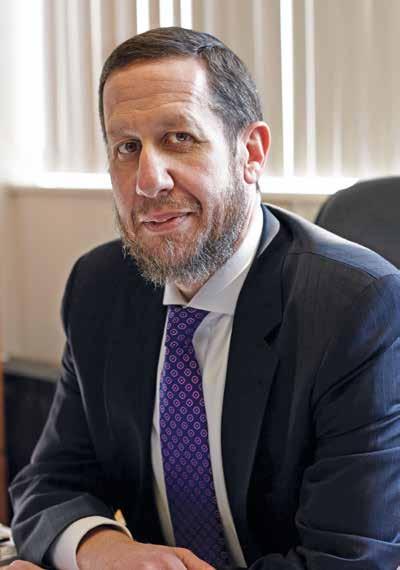
frequently check and compulsively use smartphones at home, their children adopt and imitate their behaviours.”
Could you imagine listening to old people’s stories, fifty years from now? How terrible that experience is going to be? “What’s this grandma?” “Here’s a picture of my breakfast! What a breakfast that was! And here are some shoes that I once thought about buying. And here is the wing of a plane, and here is the weather forecast. And here is a picture of your great grandmother staring at herself in the bathroom mirror; and here are twelve more of that exact same photo!”
Without any sensible boundaries or limitations on our own behaviour it’s no surprise that so many children are now displaying similar signs of smartphone addiction. According to Ofcom, 91 percent of 11-year-olds now own a smartphone, and spend on average close to a whopping four hours a day on their device.
But here’s the kicker Marion: Studies show evidence of a strong correlation between parental smartphone habits and those of their children. “If parents
You haven’t mentioned what your own phone habits are, but I suspect you’ll recognise yourself in some of the aforementioned. So, if you want to break the cycle it has to start with you.
The problem is addicts are frequently advised to distance themselves from environments and individuals that may trigger their addiction. What can you do to break your own addiction when your phone is by your side. With all the willpower in the world, the moment that phone pings, you’re going to wonder which friend is reaching out with the latest piece of gossip.
Perhaps some baby steps: Definitely no phones at the dinner table and leave your phone away from your bedroom at night. I challenge you to begin with those two. If your kids become aware of your own high level of commitment, then they’re likely to mirror it and longer term will ensure to do the same.
People think the ultra-Orthodox are antiquated for their “smartphone ban” in their communities. Actually, their healthier for it and, as often is the case, they are really onto something.

Can you tell us about your role at Hampshire Heights and how long you have been with the company? I am the Head of Property Management, a role I have held since July 2020, a few months after the COVID-19 pandemic began. Taking on this role during such an unprecedented time has been both challenging and rewarding. My primary responsibilities include overseeing the management of our property portfolio, ensuring compliance with all relevant regulations, and maintaining high standards of service for both landlords and tenants.
How do you start your workday, and what are your first tasks when you arrive at the office or begin your workday? My day begins with a good cup of coffee, which helps me kick-start my morning. I then dive into my emails, responding to any urgent matters and prioritizing tasks for the day. Once my inbox is under control, I usually head out for property inspections. These inspections are crucial for identifying unresolved issues, whether related to maintenance, tenant complaints, or compliance. Addressing these concerns early in the day sets a positive tone for everything that follows.
Are there any ongoing projects or initiatives that you are currently working on that excite you?
Currently, I am leading a major refurbishment project across a significant portion of our portfolio.
We secured a green grant from the government, which allowed us to re-render properties and install solar panels at no additional cost to the landlords. This initiative not only improves the sustainability of our properties but also enhances their value, making it a particularly exciting project for me.
What are your main responsibilities throughout the day? Can you walk us through a typical day in your life? My role involves a lot of problem-solving, ensuring all properties in our portfolio are compliant with current regulations, and keeping maintenance operations running smoothly. A typical day includes coordinating with my team to address any issues that arise, updating colleagues on ongoing situations, and liaising with my maintenance manager to ensure timely and quality repairs. It's a fast-paced environment that requires adaptability and quick decision-making.
Can you describe a challenging task you regularly encounter and how you handle it? One of the recurring challenges is dealing with anti-social behavior among tenants. My approach involves initially trying to communicate directly with the tenant to understand the root of the problem and see if we can resolve it amicably. If the tenant is unresponsive, I follow up with an email and, if necessary, make a personal visit or instruct my colleague, Asher, to visit the property. Our goal is always to find a peaceful resolution while maintaining a good relationship with all parties involved.
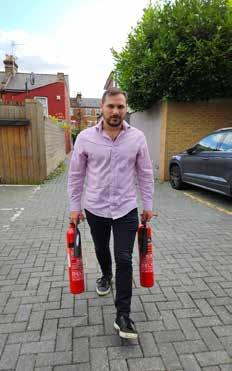
How do you communicate with tenants, landlords, and other team members? Can you share an example of a recent interaction that stands out? Effective communication is key in my role. I use a variety of channels, including phone calls, emails, and face-to-face meetings, to ensure clear and consistent communication. A recent example involved a landlord who had very specific requirements for a maintenance task. To ensure his needs were met, I personally coordinated between the landlord and our contractor, ensuring every detail was communicated clearly. The result was a successful project that met the landlord's specifications precisely, showcasing the importance of clear communication.

How do you wrap up your workday, and what tasks do you focus on before heading home? Before leaving the office, I ensure that all my emails are addressed, as prompt communication is crucial in our field. I also review the maintenance list with the head of maintenance to ensure all tasks are on track and go through any rent arrears lists that need attention. This end-of-day routine helps me start the next day on a strong footing.
What skills or qualities do you think are essential for success in property management? Initiative is crucial in property management, as is the ability to work effectively under pressure. Strong communication skills are also essential, as they enable us to navigate complex issues, build relationships, and ensure all parties are informed and satisfied.
Is there anything you would like to change or improve in your daily routine or role? One area I’d like to improve is remembering to take regular lunch breaks. It’s easy to get caught up in the fast pace of work, but taking a break is essential for maintaining energy and focus throughout the day.
What do you enjoy doing in your spare time, and how do you relax after a busy day? In my free time, I enjoy cooking a nice dinner and watching a good comedy to unwind. I also love going to the pub with my friends for a beer, which helps me relax and recharge after a busy day at work.




BY RABBI SHMUEL REICHMAN
We are often told of the importance of having emunah in Hashem, but what exactly is emunah?
Emunah is often translated as “faith”; the dictionary defines faith as a “firm belief in something for which there is no proof.” Faith is generally viewed as a “personal opinion,” a “subjective belief,” an “emotional decision,” or a “blind leap.”
Knowledge (yediah), on the other hand, is objective, unconcerned with opinion and belief. Without knowledge, there is no basis for argument. For example, if two people argue over which flavor of ice cream is superior, chocolate or vanilla, they are simply expressing two subjective opinions; their arguing is fruitless. Neither side reflects the objective truth, because there is no objective truth in this case. These are both subjective beliefs. Knowledge deals with objective facts, that which is not subject to belief or opinion. We therefore ended off our previous article with a profound question: we can either be commanded to have blind faith in Hashem or to know Hashem, but not both.
• If we are commanded to know Hashem, what need is there for emunah (faith)?
• And if we are commanded to have faith (emunah) in Hashem — to believe in something unknowable — how can we also be commanded to know Hashem?
The answer is that both knowledge (yediah) and emunah are required, and knowledge of Hashem is, in fact, objective and attainable. However, emunah does not mean having faith in Hashem; it means being faithful to Hashem. The goal in life is to first achieve knowledge of the ultimate emes, true and objective knowledge of Hashem. Obtaining this knowledge of Hashem requires a serious commitment to the pursuit of emotional, intellectual, and post-rational truth. The real challenge, however, is emunah — being faithful to that knowledge. As human beings, we uniquely possess free will. We can know for a fact that something is wrong, and yet choose to do it anyway. Take, for example, the case of a man diagnosed with Beurger’s disease, which makes him extremely sensitive to the nicotine in cigarettes. If someone with this condition smokes, the blood vessels constrict, leading to the loss of fingers, hands, and even full limbs, with almost one hundred percent certainty. Because this condition is fully linked to smoking, it can be avoided by simply not smoking. This man happens to be an intelligent engineer, fully aware of the consequences should he continue smoking. And yet, he fails to quit smoking, and over the course of a few months, he proceeds to lose both his legs and eventually his arm as well. Through all of this, even after losing his limbs,
he continues smoking.
One might ask how this is even possible. The answer is simple. As human beings, we possess free will. We have the ability to choose whether to loyally live by the truth or to block out the truth — clouding our intellectual clarity for more immediate, mundane pleasures. This intelligent man was willing to endure extreme consequences, despite the shockingly clear effects of his actions, for the fleeting pleasure and instant gratification of a cigarette.
This principle is the key to understanding emunah. Emes is truth; emunah is being faithful to that truth. Chazal say, “Leis emunah b’lo emes,” there is no emunah without emes, and we say the paragraph of “Emes V’Emunah” every night in Maariv, right after Shema. (We mention this right after Shema, because emunah is the ultimate expression of “hearing” in the dark.) Emes is the objective truth; emunah is the attempt to align yourself with that truth and live faithfully according to it. The ideal is living with emunah to the emes, faithfulness to the objective truth. Without emes, though, emunah is empty.
Emes is the root, the starting point and anchor of everything, but our connection and relationship with it is often fleeting. Emes is like a flash of lightning, a spark of inspiration. A powerful speech, an inspiring moment, or a profound idea can change our whole perspective on life. Suddenly, we see everything so clearly, we realign our goals, and everything falls into place. However, the very next day, we often find ourselves right back where we were before, as if nothing ever happened. What happened to the clarity of that emes, the power of that vision?
and to create ourselves. Now that we have tasted the first stage, the emes, we know what we’re meant to choose — what we can build. The third stage, achieved through the hard work of the second stage, is the completed rebuilding of the original perfection. While this stage may appear the same as the first, it is fundamentally different. It’s real, it’s earned, it’s yours. The first stage was a gift, a spark of emes, but an illusion. The third is the product of the effort and time you invested through the stage of emunah.
The ideal is to reach the point where emes no longer fades away — where the truth of reality becomes ingrained in our consciousness to the point that it becomes our default, governing every aspect of our life. The question is, how do we achieve this?

When one knows something is harmful and eats it anyway, it’s generally not because they know this and choose to ignore it. It’s because they have the wrong type of knowledge. There are two forms of knowledge. Intellectual, conceptual knowledge dictates that 1+1=2. If someone asks you to solve this equation, you can easily do so using your rational faculties. But rational knowledge is not intrinsic knowledge; it is a skill and tool that you are able to utilize. Many people possess rational knowledge of morality and spirituality. Intellectually, they know what is moral and immoral, and intellectually, they know that Hashem exists. However, when a desire competes with our rational knowledge, it is all too easy to blind ourselves from the truth, pushing aside our conscience to make room for this conflicting desire.
crystal-clear lens that it is virtually impossible for them to do anything but operate in line with the truth. While they do have a very limited sense of free will, doing something wrong as an angel would be akin to walking into a fire. They may have the free choice to do so, but the scalding hot flames are more than enough to stop them.) This is the challenge of emunah, this is the journey of life. (As the Maharal explains (Nesiv Ha’Emunah, chap. 2; see Sotah 48b and Rashi there), living a life of emunah creates a vessel for emes to flow into, creating a space for Hashem to enter. The smaller the vessel, the less you connect to emes; the more space you make, the more Hashem flows in.)
The essence of the relationship between emes and emunah is expressed in the words themselves. The word emes is comprised of the letters aleph, mem, and tav. Aleph is the first letter of the aleph-beis, mem is the middle letter, and tav is the very last letter in the aleph-beis. The word emes spans the entirety of the aleph-beis, reflecting the nature of truth. (See Shabbos 55a and Rashi there.) Truth is holistic, all-encompassing, and objective. While the word emunah is very similar to emes, it has one distinct difference. Amen, the shoresh of emunah, begins with the same aleph and mem of emes, reflecting its source in ultimate truth. It concludes, however, with a nun, the letter in the alephbeis that directly follows mem. Emunah is the process of working toward emes, the journey toward the ultimate, ideal endpoint. In the word emunah, aleph represents the initial flash of inspiration, mem represents the starting point — the place from where you must begin working toward the realization of that initial inspiration, and the nun following the mem represents the journey from mem toward tav, toward the ultimate and complete truth, toward emes. The word “amen” literally means, “let this be true.” It is an affirmation, a desire to attain and reflect emes.
This is the challenge of emes. It is powerful, but it is fleeting. It fades almost as quickly as it appears. The moment you stop thinking about the emes, that truth disappears from your consciousness. As we have explained before, the spark of inspiration is there to help you experience the goal, the destination. It’s a taste of what you can, and hopefully will, ultimately accomplish. But it’s not real; it’s given as a gift, and is therefore an illusion. It serves only as a guiding force, but it cannot compare to the genuine accomplishment of building something yourself. It is therefore taken away to allow for the second and most important stage, the stage of emunah: this is the phase of building, of undergoing the work required to attain this growth in actuality, to work for the perfection that you were shown. A gift is not real; something chosen and earned is. We are in this world to choose, to assert our free will,
There is another type of knowledge, however, which makes it impossible for one to ignore their moral compass. This is experiential knowledge, a type of knowledge that is known so deeply and powerfully that it becomes part of one’s very consciousness and self. This knowledge cannot be overcome, nor can one blind themselves to it, no matter how strong the competing desire. When one is so deeply aware of spiritual truth, so inseparably attached to Hashem, it is impossible to push that emes aside. It takes a lifetime of emunah, of commitment and faithfulness to the truth, to reach this point where one existentially connects to emes in such a powerful way. When one reaches this stage of knowledge, their very identity and self becomes a reflection of objective truth, of a higher reality. This truth cannot be blocked out; one cannot but live by it. (The Nefesh Hachaim explains that this is the type of knowledge that angels have. They understand reality with such a
In our next article, we will delve deeper into this fascinating topic and try to understand the nature of emunah on an even deeper level. In the meantime, may we all be inspired to continue to embark on the journey of becoming our ultimate selves!
Rabbi Shmuel Reichman is a bestselling author, international speaker, and the CEO of Self-Mastery Academy. He has lectured internationally on topics of Torah thought, Jewish medical ethics, psychology, and leadership. He authored a bestselling book, The Journey to Your Ultimate Self. After obtaining his BA from YU, he received Semicha from YU’s RIETS, a master’s degree in education from Azrieli Graduate School, and a master’s degree in Jewish Thought from Bernard Revel Graduate School. He then spent a year studying at Harvard as an Ivy Plus Scholar.



BY RAV YOSEF ZVI RIMON
In Parashat Devarim (1:12), Moshe says to the people, “How can I alone bear your contentiousness, your burdens, and your quarrels?”
Is this a tone of complaint? Rashi thinks it is. The people were annoying and prone to argument. The Ramban says this does not show Israel’s lowly status but the reality: Am Yisrael had grown and needed more than one judge. This episode is a continuation of Parashat Yitro, in which the need for a team of judges became clear.
The simple meaning of the verses reinforces the Ramban’s opinion, for in the previous verse, Moshe says he can’t carry them by himself and they are as many as the stars in the heavens. He even blesses them, and only then says, “How can I alone bear…” In other words, because of the people’s natural growth, they need additional judges (see verses 1:9–14).
Nevertheless, the people behave as Rashi describes them. When the ba’al koreh reads this verse in shul, he reads it

1st Aliya (Kohen) – DEVARIM 1:1-10
In the 40th year after leaving Egypt, towards the end of his life, Moshe gathers the nation together and rebukes them, alluding to the many places where they made mistakes since leaving Egypt (Rashi). Moshe recalls the time spent at Mount Sinai after receiving the Torah, and that the nation could have gone from Sinai straight into the Land of Cana’an. At that stage, Moshe realised that he needed assistance to lead such a big nation.
2nd Aliya (Levi) – 1:11-21
Moshe therefore told the people to appoint judges over sub-groups of 1000, 100, 50 and 10 men.
He told those judges to be fair and brave in their work, and that any dispute too difficult to resolve should be brought to
to the sad tune of Eicha.
Perhaps, even if the Ramban is correct, this reading comes to teach us, before Tisha B’Av, to leave the small stuff aside, desist from quarreling, so we can build together and attain blessing.
When we are on a mission, something bigger than us, we need to leave the small, private bickering behind (see Sforno’s commentary). See the divine, sense the greatness of the vision, the import of the mission. When an entire people see their mutual lofty goal, they can then leave the small stuff behind, stop the internal fighting and grow into greatness.
Despite our current physical reality, let us see the bigger picture. Baruch Hashem, Am Yisrael is recognizing the enormity of its mission. The vast majority of Jews do not live in a world of pettiness and pointless argument.
Here are just a few examples:
• We can feel the unity (we’re working on a huge unity project, to ensure the unity will continue long after the war is over).
• Jews overseas are helping and
Moshe himself.
3rd Aliya (Shlishi) – 1:22-38
Moshe recalls the sin of the spies. The people had approached Moshe 38 years earlier, wanting to send a mission to inspect the Land. Moshe agreed and selected 12 leading men, one from each tribe. Upon their return, Yehoshua and Calev spoke positively, but the other spies persuaded the people that going into the Land was impossible, due to the giants and the strongly fortified cities. Moshe’s attempts to reassure the people of G-d’s protection when they would enter the Land were rejected. G-d then decreed that the generation who had accepted the negative report of the ten spies would die in the wilderness and not enter the Land.
Point to Consider: Why did Moshe agree to sending spies, if he would later rebuke them for the mission? (see Rashi to 1:23)
4th Aliya (Revi’i) – 1:39-2:1
Those aged under 20 at the time of the sin of the spies would be allowed to enter the Land. Despite Moshe’s discouragement, some of the people then attempted
supporting – sending resources of all kinds, lobbying their governments, and visiting all the time.
• We spend a lot of time with soldiers. They are highly motivated to save the Jewish people. It’s the same with our wounded heroes as well.
• I’ve been asked one identical question by many new IDF recruits: Can I make the shechechiyanu blessing? No one wants war. No one wants to fight. However, when they come to annihilate us, we see it as a great privilege to be able to defend ourselves. That’s something we have not merited for thousands of years. So from that perspective, yes, “...shechechiyanu v’kiy’manu v’higianu lazman hazeh,” a time when Am Yisrael is fully entitled to defend itself.
• And above all, we clearly see G-d’s helping Hand. The Americans predicted a far greater death toll among soldiers fighting in a built-up area. The total neutralization of the Iranian attack, etc. etc. We are not ‘bearing it alone.’
We pray our soldiers will succeed in their mission and return home safe and sound.
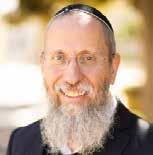
We pray for the full recovery of the wounded.
We send our love and support to all those who still have soldiers in the army. And we pray for the immediate return of our hostages and embrace their families.
Redemption is not a supernatural process. Redemption comes through natural means. Chazal taught us there will be challenges along the way, but they are an integral part of our ascent.
May we see how the reality is leading Am Yisrael to a destination that is higher, holier, more unified and more loving. For it is this love between us, b’ezrat Hashem, that will be a vital springboard on the way to our full Redemption.
Rabbi Yosef Zvi Rimon is the Nasi of World Mizrachi. He serves as the Chief Rabbi of Gush Etzion, Rosh Yeshiva of the Jerusalem College of Technology and is the Founder and Chairman of Sulamot and La’Ofek. He is a member of Mizrachi’s Speakers Bureau (www.mizrachi.org/ speakers).
to enter the Land, despite Moshe’s warning that G-d would not now allow them to enter. They refused to listen and were brutally crushed by the Emorites. The nation wept and then turned back towards the Sea of Reeds.
5th Aliya (Chamishi) – 2:2-30
Moshe then recalls that 38 years later, the Israelites turned northwards and passed by the descendants of Esav in Seir, making sure not to start a war with them, nor to take any provisions without payment. The nation then headed towards the Moabite desert. G-d instructed Moshe not to start a conflict with Moab. Conversely, on their march towards the Land, G-d instructed them to pass through the land of Sichon, the king of Cheshbon, albeit this might lead to a war.
6th Aliya (Shishi) – 2:31-3:14
Sichon came out to wage war. The Israelites destroyed him and his nation, taking his entire land, with the exception of Ammon. The nation then successfully defeated the other Emorite king, the mighty Og, king of Bashan, conquering his territory.
Moshe apportioned the land taken from Sichon and Og to the tribes of Gad and Reuven and some of the tribe of Menashe (as detailed in parashat Matot – see Bemidbar 32). However, the men of these tribes were still required to enter the Land of Cana’an to fight with the rest of the nation. Moshe told his successor Yehoshua that just as G-d had helped them to defeat Sichon and Og, so too He would help them in their conquest of the Land.
HAFTARAH CHAZON (YESHAYA 1:1-27)
This haftarah, taken from the beginning of Yeshaya (Isaiah), is the third of the three ‘haftarot of tribulation’ and is always read on the Shabbat before Tisha B’Av. The prophet relates G-d’s rebuke of the nation for rebelling against Him and bringing animal offerings without actually addressing their sinful ways. The verses of rebuke are traditionally read to the tune of Megillat Eicha (Lamentations), which is recited on Tisha B’Av. Yet the haftarah ends with the hopeful message that Zion “will be redeemed with justice”.


Many victims of the Holocaust were young children under the age of 12 and 13 who did not live to celebrate their Bar or Bat Mitzvah.
You can make sure their names are never forgotten.
Complete the on-line Twinning Form to make your day even more special by sharing it with a child Holocaust victim who was denied a future, and become a link in the chain of the wonderful miracle of Jewish History. A Yad Vashem researcher will find a twin from the vast records whose life matches yours as closely as possible.
The Twinning Pack consists of:
• A Page of Testimony with details of your chosen twin
• A Study Guide
• A certificate
• A letter from a Holocaust survivor
• A Yad Vashem lapel pin
• Memorial and Shabbat candles
• An invitation to become a Guardian of the memory



Phone: 020 8187 9881















www.yadvashem.org.uk








Email: office@yadvashem.org.uk
www.guardianofthememory.org






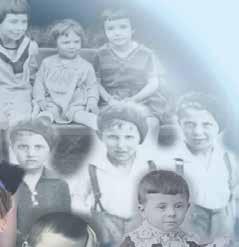










@yadvashemukfoundation








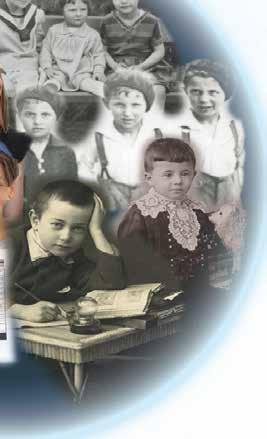



Last week we finished the fourth book of the Torah; Bamidbar. This means…. Drumroll please, it’s time to start the fantastic and final book – Devarim. The first parsha, Devarim herself is Moshe’s speech to Klal Yisrael. Remember how Hashem said that Moshe would die after the battle with Midyan? Now’s the time, so Moshe gives one last speech to inspire us to keep the mitzvois and stay loyal to Hashem. He spoke for over 30 days! Moshe goes through everything that happened to us in the Midbar. We go all the way back to when Hashem gave us the Torah!!! Hashem Himself, opened up the heavens and made us His people and gave us the most precious gift of all. That’s not all He
did, just in the midbar; He sent the pillar of fire and the column of cloud to guide us, gave us the clouds of glory which made the ground soft for us to walk on and protected us from dangerous animals, snakes, scorpions and our enemies, made all our clothes stay clean and grow with us, dropped down the marvellous mann that tasted of whatever you wanted without having to go to the bathroom, we had the well of Miriam and if the list isn’t long enough yet, every time our enemies attacked, Hashem saved us. and we were on the way to the promised land.
How did we thank Hashem? By complaining! Moaning and groaning, we didn’t appreciate all the amazing
S R C H E S H B O N X N
E I X L T S M D G B S Q
T E C Q I I S T S Y J N
U S R H R C J E Y B M J
P Y M A O A L G H T R I
S Y V M M N S Y K M C B
I E K R E A Z D Z K N Q
D P G R S A G N W N W R
P F O D M N U X T D F L
W B C J U Y M U I W P I
R J N I H J U A C O P Z
E U S L R V L Y N U G Q
things we had. Hashem interrupts Moshe before he can carry on with the telling off. Hashem doesn’t want the speech to be too strict so Moshe gives us a brachah that we should have many children and become a great people.
It wasn’t just Hashem we weren’t grateful to. Moshe worked his socks off for us and look at all the trouble he had! Rebellions, Korach, the eruv rav… we even caused him to die before he got into eretz Yisrael.
Moshe recaps the story of the meraglim, the spies which is the reason it has taken 40 years to reach Israel.
Next Moshe gives us a message from Hashem, three nations we must
not touch. Edom because they are Yakov’s brother’s children, Moav and Edom. The last two are because Rus, King David’s grandmother and Na’amah, King Shlomo’s wife will be converts from those nations.
Moshe finishes off this parsha by telling the story of how Sichon tried to attack us but Hashem moved the mountains together to squash them. Then Sichon came with an army and we beat him! Then we had to fight their neighbours Og and Reuvain, Gad and half of Menashe decided to live in their part instead.
That’s all for now!
Number of Verses - 105
Number of Words - 1,548
Number of Letters - 5,972
Last week’s answer: Two exactly identical people in the exact same place on the exact same day do the exact same act with the exact same intentions. However, the first one is fulfilling a mitzvah d’oraita, a Torah commandment, and the second one is transgressing an issur d’oraita?
The answer is:
The first person ritually slaughters a female animal. The second one ritually slaughters the offspring of that animal. The first one has done a mitzvah, and the second one has done a sin, as the Torah says, “A cow or sheep, it and it’s child you shall not slaughter on the same day.”
(Leviticus 22:28)
Well done to 10 year old, Azriella Murkoff!!
This week’s Question:
What is the shortest word in the Torah?
Using all the shapes, can you make the shape on the right?
The goal of a word wheel puzzle is to create as many words possible with the letters in the word wheel. Each word must contain at least three letters. You can only use each letter once and every word must have the letter in the centre of the wheel.
Last edition’s words
Here are some words you may have found from last week – you may have found more!
Use the area below to write the words you have found. A L V N T I A O S
Q: What did the nose say to the finger?
A: Stop picking on me!
Q: How can you tell a vampire has a cold?
A: They start coffin!
Q: Where do burgers go to dance?
A: The Meat-ball!
Q: Why do space rocks taste better than earth rocks?
A: Because they are
1. I am an odd number. Take away a letter and I become even. What number am I?
2. At night they come without being fetched. By day they are lost without being stolen. What are they?
3. Lighter then what I am made of, more of me is hidden than is seen. What am I?








